#this series represents two decades of my life
Explore tagged Tumblr posts
Text
i'm in some sort of Mood about finishing the kh series (for a given value of finished) since I've been playing it since kh1 on ps2 a million years ago but instead of dealing with that i'm going to write my mini retrospective of the titles based on my replay
rest below the line
kh1
story - 7/10. it wasn't the most interesting but it was the first and laid the groundwork for the series. maleficent had a lot of screentime which is always a big plus. love her evil ass. it's also the start of the 'kairi never gets to do anything ever and gets kidnapped every time she tries' persisting problem in the whole series
gameplay - 6/10. feels a bit clunky now in comparison to some of the newer ones. it was harder than some later ones, but mostly because of wonky control issues and not great boss fights. but it's very playable and fun still. mushrooms do a little dance and shake their butt at you. i will never not feel nostalgic about traverse town music. THANK GOD YOU CAN SKIP THE PRE FIGHT CUTSCENES ON RETRIES NOW OH MY GOD YOU DON'T UNDERSTAND THE ONE BEFORE THE DARK RIKU FIGHT WAS LIKE TEN MINUTES AND BACK IN THE DAY YOU HAD TO REWATCH IT EVERY TIME AAHHHHJHHH *i am tranquilized and removed from the room*
re: chain of memories
story - 8/10. i love the focus on the organization 13 internal drama. bitches are running around bad mouthing and killing each other. larxene is a constant joy. marluxia is pretty and goes swish swish and makes flowers. axel was an instant fave. zexion is a shitty twink and i do so love shitty twinks. there was some disney stuff too i guess
gameplay - 2/10. the first time i played it my brother was crashing at my apartment and watching me play and got very into making cool deck combos. so i had him do that for me and i did the combat and the fun sibling shenanigans got me through it. this time i quit after thirty minutes and watched the cutscenes on youtube. it's just so repetitive and meh
358/2 days
story - 7/10. that's too many soras! put some back! story was a bit slow at times but i did enjoy seeing the daily life of the organization and axel/saïx handling their divorce so so well. needed more demyx
gameplay - it's packaged as a movie now so i did not replay the game and can't fairly rate it. i remember it being not the best combat but not terrible for a ds game
kh2
story - 8/10. it would get higher but the fact the beginning is incomprehensible if you haven't played com and 358 loses it some points....i had not played com when i got kh2 and boy howdy. it made more sense on the replay of course and yeah it's a good story. obsessed with how maleficent remains one of the main recurring characters in this series and just Does Shit from time to time because why not. god forbid women do anything etc. also the gay divorce continues to go terribly. saïx is handling this so well i say as he goes into berserk mode again. needed more riku screentime tho
gameplay - 9/10. huge upgrade from previous titles. it was very fun and fluid. the form shifts were a great addition. there were a lot of options but it didn't feel overwhelming or like it disrupted combat. my only real complaint was it felt a bit too on rails at some parts... like cutscene, battle, walk three steps repeat. oh and i hated the gummi missions but i am a gummi hater in general. oh also antiform was amazing. sora can turn into a feral creature... as a treat
birth by sleep
story - 10/10. fuck i love birth by sleep. aqua my beloved daughter who is the most terrifying keyblade master ever. terra my troubled son who got fucked over by shitty adults on an hourly basis. ven the thousand year old little kid who has never caught a break once. also hey it's xehanort and he also has ex husband drama. only note is that aqua should get to say fuck
gameplay - 10/10. the command deck was right up my alley and command forms were the best form gameplay they've done. i loved how all three kids had a unique style and abilities. i loved melding cards and gems to make new cards. i enjoyed playing monopoly. i thought it was the best game in the series when i first played it and that remains true
re:coded
story - 6/10. it was okay? it was largely a rehash but did add a few things. my friend and i kept saying welcome back alvis whenever data riku used a computer so that was fun
gameplay - this was also presented as a movie in the bundle so i won't score it. i don't even remember how it was from way back when i played it
dream drop distance
story- 9/10. the games that switch between multiple perspectives seem to be my favorites and i think it's partly that it makes the story more interesting. the time traveling norts were a bit wtf but that's just an inescapable part of the series. inspired me to get twewy which i will be playing next. MEOW WOW!!!!!
gameplay - 9/10. flowmotion was really neat and fit the style well. i loved the pokemon aspect so much you have no idea. i was a little sad you couldn't meld command cards but it would have been Too Much with all the other stuff going on. a few fights near the end had some really dumb mechanics (the type where when you look up a guide it just says good luck) but there were also some excellent ones. i do think it lost a little something in the port because the stylus on 3ds was important. however there is nothing is quite as satisfying as seeing meow wow hit xehanort with giant bouncy orbs so I'm willing to forgive it a lot
union x/back cover/dark road
story - 9/10. i was shocked how much i enjoyed the story of these. i got very invested and i was only watching the cutscenes, not playing. really interesting world building and the master of masters was an instant fave. one of the only kh titles that passes (barely) the bechdel somehow. also could be retitled as kh: dead kids, because boy did a lot of kids die! extra points for maleficent managing to set major events in motion twice and being very eh whatever about it. love her for that. and the backstory of the xehanort/eraqus divorce, of course. i love a good divorce
gameplay - didn't play this one, just watched ELEVEN HOURS of cutscenes. no longer available which is hilarious considering how much important lore is in it that is referenced in kh3. hopefully they make it into a single player offline game someday with better gameplay
fragmentary passage
story - 8/10. very short but filled in some gaps. i love aqua so i was predisposed to love this one
gameplay - 8/10. it felt like a rough draft for kh3 and that meant it didn't have all the annoying extra crap kh3 added in and played pretty smoothly. i liked the little puzzles. it was a unique game and i enjoyed it more than i expected
kh3
story - 6/10. the fact i had to sit through entire disney movies worth of cutscenes brings the score way down. we did not need to see 3 musical numbers in frozen. if i wanted that I'd watch the movie. i just wanted to play the damn game. the majority of the game is sora got benched and has to get his groove back which was very disappointing for the climatic finale to the series. once i got into the end game though it was much better (i would rate the later game stuff way above a 6 which just makes my frustration with earlier stuff worse). re:mind added in the bits i felt were missing and i came away satisfied overall with the wrap up. axel/saïx had divorce arc three and then got back together finally 🏳️🌈🥂🎉. xehanort/eraqus also got back together as they fucked off to be gay in the afterlife. finally we are free of the norts (OR ARE WE???) and the master and the foretellers are slated to come back next from the looks of things. maleficent continues to hang out in the wings waiting for opportunities to #girlboss and I'm excited too see what cataclysmic events she sets off next
so that's it. i did watch the brief melody of a memory scenes but there wasn't too much new there. i may watch the cs from the missing link beta at some point. otherwise it's back to my life long journey of waiting for the next title to drop
gameplay - 5/10. ugh. i bought the game when it came out but between the full length disney movies and the over saturated gameplay gimmicks i didn't get far. this time i powered through and by the end i was enjoying it for the most part because I'd figured out what things to ignore and how to avoid them. attractions were the worst addition to gameplay ever. everything was too flashy. way too many instances of being locked in a "cool" transition animation instead of actually doing combat which broke up the flow of things. i missed the command deck and how much it let you customize your play style. i didn't like the keys being locked to command forms as much as the bbs forms since it meant if you had a keyblade with better stats but hated the special on it you were kinda fucked. this became less of a problem as the game went but was still annoying. overall felt like a step back from the others. they tried to do too much. oh also why were there ten thousand instances of having to learn new controls for some new mini game in every area??? just let me hit things i am begging you. it really felt like they went for cool spectacles over satisfying gameplay
general notes on all of them: i enjoyed the story much more this time due to being able to play them in order. the fact they all released on different platforms originally made the complicated story even more confusing since i couldn't afford to buy a new system every time a new one came out. i really hope they veer away from that practice in the future but i kinda doubt it especially since they've got another mobile game lined up already. while the disney stories were fun early on it felt like the story outgrew them (except for the characters who were in the main story as well like mickey and maleficent) and they were kinda a drag by 3. i doubt they can move away from those since they're the whole gimmick of the series but it would be better imo. deeply worried they'll start bringing in newer disney acquisitions.
one of my biggest complaints about the series has always been how few female characters there are and how little many of them are used. it got slightly better later in the series but overall was still not great, especially for kairi. i kept wondering if they added stuff for her in re:mind due to complaints about this.... the dlc felt like an apology for several things tbh. aqua was great but she shouldn't be the only one and even she got upstaged in kh3 when she's supposed to be the third most powerful keyblade master. weirdly enough maleficent was probably the best written female character. really wild how much she wove into the plot and affected events so much without even trying to (especially in union x). she should fire pete though (i think she should hire demyx)
I'd like to see them let you play as characters other than sora more often since that was always really neat (he's had a billion games to himself now). I'd love a kairi and aqua game but i can imagine square and disney both clutching their pearls over female protagonists
something i noticed was that playing them when i was older i liked sora much better. when i started the series as a teenager i found him annoying. as an adult i have more sympathy and tolerance for teenaged boys who are Going Through It. growth or something
5 notes
·
View notes
Text
Please come and see me because I’ll be dead soon’: how Michael Sheen got sucked into a forever chemicals exposé
An opera-loving member of high society turned eco-activist who was forced into police protection with a panic button round his neck. A Hollywood actor who recorded said activist’s life story as he was dying from exposure to the very chemicals he was investigating. Throw in two investigative journalists who realise not everything is as it seems, then uncover some startling truths, and you have “podcasting’s strangest team” on Buried: The Last Witness.
On their award-winning 2023 podcast Buried, the husband and wife duo Dan Ashby and Lucy Taylor dug into illegal toxic waste dumping in the UK and its links to organised crime. This time, they focus on “forever chemicals”, specifically polychlorinated biphenyls (PCBs) and set out to discover whether one whistleblower may have been decades ahead of his time in reporting on their harmful impact.
“It’s amazing how big the scale of this story is,” says Ashby, as we sit backstage at the Crucible theatre, where they are doing a live discussion as part of Sheffield DocFest. “With this series, we don’t just want it to make your blood turn cold, we want it to make you question your own blood itself.”
It all started when Taylor and Ashby were sent a lead about the work of former farmer’s representative Douglas Gowan. In 1967, he discovered a deformed calf in a field and began to investigate strange goings on with animals close to the Brofiscin and Maendy quarries in south Wales. He linked them to the dumping of waste by companies including the nearby Monsanto chemical plant, which was producing PCBs.
PCBs were used in products such as paint and paper to act as a fire retardant, but they were discovered to be harmful and have been banned since 1981 in the UK. However, due to their inability to break down – hence the term forever chemical – Gowan predicted their legacy would be a troubling one. “I expect there to be a raft of chronic illness,” he said. He even claimed that his own exposure to PCBs (a result of years of testing polluted grounds) led his pancreas and immune system to stop working. “I’m a mess and I think it can all be attributed to PCBs,” he said.
However, Gowan wasn’t a typical environmentalist. “A blue-blood high-society Tory and a trained lawyer who could out-Mozart anyone,” is how Taylor describes him in the series. He would even borrow helicopters from friends in high places to travel to investigate farmers’ fields. Gowan died in 2018 but the pair managed to get hold of his life’s work – confidential reports, testing and years of evidence. “I’m interested in environmental heroes that aren’t cliche,” says Ashby. “So I was fascinated by him. But then we started to see his flaws and really had to weigh them up. My goodness it’s a murky world we went into.”
The reason they were able to delve even deeper into this murky world is because of the award-winning actor Michael Sheen who, in 2017, came across Gowan’s work in a story he read. He was so blown away by it, and the lack of broader coverage, that he tracked him down. “I got a message back from him saying: ‘Please come and see me because I’ll be dead soon,’” says Sheen. “I took a camera with me and spent a couple of days with him and just heard this extraordinary story.”
What Gowan had been trying to prove for years gained some traction in 2007, with pieces in the Ecologist and a Guardian article exploring how “Monsanto helped to create one of the most contaminated sites in Britain”. One was described as smelling “of sick when it rains and the small brook that flows from it gushes a vivid orange.” But then momentum stalled.
Years later, in 2023, Ashby and Taylor stumbled on a recording of Sheen giving the 2017 Raymond Williams memorial lecture, which referenced Gowan and his work. Before they knew it, they were in the actor’s kitchen drinking tea and learning he had conducted a life-spanning seven-hour interview with Gowan before his death. So they joined forces. Sheen isn’t just a token celebrity name added for clout on this podcast; he is invested. For him, it’s personal as well as political. “Once you dig into it, you realise there’s a pattern,” he says. “All the places where this seems to have happened are poor working-class areas. There’s a sense that areas like the one I come from are being exploited.”
Sheen even goes to visit some contaminated sites in the series, coming away from one feeling sick. “That made it very real,” he says. “To be looking into a field and going: ‘Well, I’m pretty sure that’s toxic waste.’” Sheen was living a double life of sorts. “I went to rehearsals for a play on Monday and people were like, ‘What did you do this weekend?’” he says. “‘Oh, I went to the most contaminated area in the UK and I think I may be poisoned.’ People thought I was joking.” Sheen ended up being OK, but did have some temporary headaches and nausea, which was a worry. “We literally had to work out if we had poisoned Michael Sheen,” says Ashby, who also ponders in the series: “Have I just killed a national treasure?”
The story gets even knottier. Gowan’s findings turn out to be accurate and prescient, but the narrative around his journey gets muddy. As a character with a flair for drama, he turned his investigation into a juicy, riveting story filled with action, which could not always be corroborated. “If he hadn’t done that, and if he’d been a nerdy, analytical, detail-oriented person who just presented the scientific reports and kept them neatly filed, would we have made this podcast?” asks Taylor, which is a fascinating question that runs through this excellent and gripping series.
Ashby feels that Gowan understood how vital storytelling is when it comes to cutting through the noise. “We have so much science proving the scale of these problems we face and yet we don’t seem to have the stories,” he says. “I think Douglas got that. Fundamentally, he understood that stories motivate human beings to act. But then he went too far.”
However, this is not purely about Gowan’s story – it’s about evidence. The Last Witness doubles up as a groundbreaking investigation into the long-lasting impact of PCBs. “We threw the kitchen sink at this,” says Ashby. “The breakthrough for us is that the Royal Society of Chemistry came on board and funded incredibly expensive testing. So we have this commitment to go after the truth in a way that is hardly ever done.”
From shop-bought fish so toxic that it breaches official health advice to off-the-scale levels of banned chemicals found in British soil, the results are staggering. “The scientist almost fell off his chair,” says Ashby. “That reading is the highest he has ever recorded in soil – in the world. That was the moment we knew Douglas was right and we are now realising the scale of this problem. The public doesn’t realise that even a chemical that has been banned for 40 years is still really present in our environment.”
To go even deeper into just how far PCBs have got into our environment and food chain, Ashby and Taylor had their own blood tested. When Taylor found 80 different types of toxic PCB chemicals in her blood it was a sobering moment. “I was genuinely emotional because it’s so personal,” she says. “It was the thought of this thing being in me that was banned before I was even born and the thought of passing that on to my children.” Ashby adds: “We’ve managed physical risk in our life as journalists in Tanzania and with organised crime, but more scary than a gangster is this invisible threat to our health.”
In order to gauge the magnitude of what overexposure to PCBs can do, they headed to Anniston, Alabama, once home to a Monsanto factory. “As a journalist, you have an inbuilt scepticism and think it can’t be that bad,” says Ashby. “But when I got there I couldn’t believe what I was seeing. I hate to use words like dystopian, but it was. There is a whole massive school that can’t be used. There’s illnesses in children and cancers. It truly was the most powerful vignette of the worst-case example of these chemicals.”
It’s bleak stuff but instilling fear and panic is not the intention. “Obviously, we’re really concerned about it,” says Ashby. “And although the environmental crises we face do feel overwhelming, it is incredible how a movement has formed and how individuals are taking action in communities. The lesson to take from Douglas is that the response doesn’t have to be resignation. It can be agency.”
#Michael Sheen#Interview#Buried#The Last Witness#BBC Radio 4#it's interesting that with two little kids at home he went in a poisoned place anyway
765 notes
·
View notes
Text
Okay, this is my first time doing this, but I need to say this, to the people who claim Sasuke's a bad clan leader, or that Fugaku and Mikoto would've accepted his relationship with Sakura had the clan survived, you're all idiots and I am not sorry for saying that.
I don't watch or read Boruto as I don't consider anything past chapter 695 as canon, but I'm still going to get this out of the way first. Sasuke never wanted to marry that bitch Sakura, he never wanted a kid with her or whatever. This man is the victim of a state-sanctioned genocide, torture, and humiliation at hands of his own brother whom he loved dearly and admired, and it was all done on orders of the state after decades of systemic segregation, oppression, prejudice, and discrimination. Sasuke was forced to relive the massacre over a million times in the Tsukuyomi and went through this twice once when he was 7 and again when he was 12 or 13, with the latter experience putting him in a coma following Itachi breaking his wrist and ribs, and this nearly killed him had Tsunade not helped him (literally the ONLY good thing she did in the series). If anyone here in the real world experienced this, they'd either be dead or in some kind of mental hospital. The point is that they would be mentally destroyed, and they'd barely be able to function in society. Regular depression already fucks people up as is, and Sasuke went something no one should ever have to go through and it's a miracle he's still able to function as is.
Sasuke also repeatedly to Sakura to fuck off and leave him alone. That bitch repeatedly pestered and harassed him for years, emotionally wearing him down until he agreed to hump and dump her ass once. This bitch emotionally abused this poor guy, so it's no surprise he not only didn't want shit to do with her or her sithspawn of a daughter. This guy wasn't emotionally or mentally stable after what Itachi did to him at 7, and he hasn't been since. Hell, it's said in one of the databooks that Sasuke originally wanted a normal life with family and friends, but Itachi ruined it with his torture sessions. Those of you shitting on Sasuke for not being a good clan leader for not communicating with Sakura or Sarada or something, don't use your heads, those two dumbasses aren't even Uchiha.
Now, onto the other part of my argument, neither Fugaku nor Mikoto would've accepted Sakura being in a potential partner for Sasuke had the Uchiha survived, however, before I start this portion let me admit that this will be hard for me to properly articulate and so I apologize in advance so with that said let's get into this.
Putting aside how shitty and lackluster of an individual Sakura herself is, she also offers or brings nothing to the table.
As other people have so beautifully said before, the Uchiha are one of the oldest and strongest clans in the series. Their lineage goes back thousands of years, dating back to the time of Hagoromo, who himself was considered a myth by the public in the present. Because of this, there's a great deal of prestige, honor, pride, and recognition that comes with their bloodlines' age. Not only that, but the Uchiha are more distinct and well-known than any other clan in the series. The Uchiha are the ONLY clan to possess distinctly potent and voluminous chakra, and because of this, they're only ones who possess and wield one of the most powerful and coveted kekkei genkai in the series the sharingan. This stems from them being the ONLY clan to have inherited the potent chakra and dojutsu of the Shinju.
The Uchiha have their own clan specific culture, mores, values, beliefs, and traditions strictly unique to themselves, for example, the clans' crest can only be worn by the members of the clan who've demonstrated mastery over their signature fireball katon jutsu and as Fugaku says to Sasuke it represents the will of those with fans who manipulate fire, use or mastery over this jutsu also makes that Uchiha a fully fledged member of the clan.
The Uchiha were known and feared throughout the world for their strength, prowess, and renown as a battle clan, so much so that other villages had rules when facing off against them. Every time someone saw or confronted Sasuke, they always brought up his lineage with reverence and fear. Two Kumo shinobi saw him and Taka carrying Bee away, and while they considered rescuing Bee, they immediately changed their minds upon seeing the Uchiha crest on Sasuke's back and instead reported to Ae about what happened. A whole crowd of wealthy patrons showed up at the Chunin Exams to see the last Uchiha battle it out, and that's why Sasuke wasn't disqualified for showing up late to his battle with Gaara during the Exams. During the Warring States Period, the Uchiha were virtually unstoppable with only the Senju due to their jutsu variety and their chieftain the freak Hashirama Senju rivaling them.
Taking all of this into account, there's no reason for a distinguished clan/bloodline like the Uchiha to take an outsider like Sakura into their midst and spoil the bloodline. Bloodline purity is a thing in the real world and persists to this very day. It's actually considered to be a huge transgression for members of distinguished clans, families, and lines to bring outsiders in and spoil their bloodlines by marrying them to the point that they're cast out and probably disowned to the highest caliber for doing it.
I wanna briefly talk about Sakura herself and explain why neither Fugaku, Mikoto, or the rest of the clan wouldn't have accepted her into their midst.
As a shinobi, Sakura is a complete nobody. She has no feats, strengths, capabilities, skills, or whatever that her remotely capable.
Her chakra reserves ridiculously tiny, she can't even handle a trickle of biju chakra. Her skillset is a complete copy pasta of Tsunade's, her skills as a medical nin are surpassed by those of Tsunade, Hashirama, Kabuto and even Sasuke during the time he had Orochimaru's white snake abilities in his system and even after he lost that, as Sasuke's self-taught himself to funnel raiton through his body to avoid mortal injury which he's done during his battles against Deidara, Bee, and Danzo. Sakura hasn't improved on, reinvented, or created her own jutsus. Her super strength is just an extension of her byakugo. She's got no talent for genjutsu or handling vast amounts of chakra. Her speed and agility feats are nonexistent, and her intelligence feats are lackluster too.
Sakura also doesn't come from a distinguished clan or bloodline. Neither she nor her parents are civilians. Let me take this time to clarify that the hidden villages house NO civilians within their midst, the hidden villages are MILITARY powers, everyone within them are soldiers, it would be antithetical for these villages to house civilian populations within them as the civilians contribute nothing to the overall prosperity and function of the village as again these are military powers within the countries. Sakura and her parents are from a smaller or minor clan within the series.
Sakura also doesn't train or take her training seriously. Sasuke points this out to her in canon during the earliest chapters of the Chunin Exams arc, and Sakura still did jackshit about it, only finally taking her training seriously after Sasuke left Konoha for good and defected to Orochimaru. And since the Uchiha again are a battle clan and the most elite clan in canon, someone like Sakura ain't being allowed within a hundred feet of them.
As an individual, Sakura, as I said above, is very lackluster and shitty. This girl has petty self-esteem issues. She knows she's lacking in various departments and tries to compensate for this by latching onto others like a leech and using them for her self-worth, Ino was originally this before Sasuke unwittingly came along. She's very shallow and vain, too.
She knows absolutely nothing about Sasuke from minor things like whether or not he wore glasses, to serious things like him being an orphan, which is ridiculous since everyone else at the academy knew these details before they were made genins. She doesn't question or try to understand Sasuke or his motivations.
She's an asshole to pretty much anyone and everyone around her whenever Sasuke's not around in canon, including other women.
She broke off her years' worth of friendship with Ino over a boy who didn't know she existed and wanted nothing to do with her. She's also made numerous attempts to downgrade and put Ino down, despite the fact that Ino was the first person to treat her with kindness, helped her with her bullies, and was the first person to validate her. Ino was also the one to try and mend and patch up their relationship. Hell, Sakura wanted Sai to call Ino ugly and was pissed when he didn't.
During the War Arc, she disrespected Tsunade, her own mentor who turned her from a nobody to a decently capable medical shinobi.
She taped a picture of her in her thirties over a picture of Karin with Sasuke and spreads rumors to Sarada about other women, like Ino trying to take Sasuke away from her.
She frequently insults and assaults Naruto, and it isn't comedy relief as she does this even after he saves her or treats her nicely. She assaulted Sai for calling her ugly despite the poor guy being a slave and Sakura name calling Naruto on a regular basis. She also attacked Konohamaru before calling her an ugly bitch (which was based on his part lol). She was also pissy about his and Naruto's sexy jutsus only to act like a fan girl when he showed her hot naked dudes, like Sasuke. So she's a hypocrite.
And she doesn't care about her own parents, and actually disrespected them, Naruto's parents, and Sasuke's as well. She tried in canon to invalidate the importance and love Sasuke had for his parents and clan, and that's tremendously disrespectful. Hell, in Boruto, she repeatedly chased after Sasuke despite being pregnant with Sarada putting her at risk, discarded the umbilical cord, which is a serious taboo, wrecked her house when Sarada asked her a simple question or two about her father, Karin frequently sends Sarada gifts instead of Sakura.
The Uchiha as a whole care deeply about one another and all within their clan, and someone like Sakura, who's again vain, shallow, petty, selfish, disrespectful, and ignorant would NEVER be considered fit to join them.
Let's play a little game of What if? Because this is something I've thought about for a while.
Following Sasuke's successful usage and mastery of the Uchiha fireball katon in front of Fugaku who himself chooses to make Sasuke his heir, Hiruzen decided to not only personally meet with and apologize to Fugaku and the Uchiha for the false accusations and punishment over the 9-Tails attack, but he also grants the clan the rights and positions of power that they deserved from the beginning, even stepping down as hokage and letting Fugaku become hokage then and there, but Fugaku maintains his decision on Sasuke being the next clan head. If this scenario took place, there's no way in Hell Sakura's going to be anywhere near Sasuke. He would've been even more untouchable for her than he already was in canon. Sasuke was already very clan oriented and duty bound in canon. He was fervently loyal and devoted to his clan and cared deeply about what they and his family thought of him, outsiders be damned. Fugaku isn't allowing any of his children, especially his heir, to marry an outsider like Sakura. The Uchiha clan in its entirety wouldn't have accepted this either. There's no way they would've accepted their future chieftain marrying a non-Uchiha, and if they did accept it, they would've accepted someone of equal standing or prestige as them. Fugaku and Mikoto would've arranged a marriage for Sasuke, and he wouldn't have objected to that. After all, Sasuke was pulling out all the stops in canon to make his father happy, and he was already extremely close with Mikoto and was well liked and respected by the rest of the clan so marrying someone his parents picked out for him is something Sasuke's definitely doing.
Let's also not forget that Sasuke's extraordinary on all fronts, in terms of beauty, skill, strength, talent, and prodigiousness, all of this, and his chakra volume and potency are through the fucking roof even the standards of his own clan. Sasuke's Sharingan is the most powerful and potent within the series since or after Indra’s which is insane as only Indra inherited his fathers chakra.
Orochimaru and Obito both knew and explicitly stated that Sasuke's Sharingan and chakra were more powerful than Itachi's. In canon, Sasuke was supposed to be THE vessel for Orochimaru, the last one he'd EVER need. Obito's entire Infinite Tsukuyomi plan hinged on utilizing Sasuke at EMS and connecting him to the Gedo Statue, something Nagato, Konan, Zetsu, and no doubt Kisame knew all to well. Kabuto knew this, too, and he himself had his own plans for Sasuke. He blackmailed and helped Obito fight a war for Sasuke, and that war was fought to see who between them could get to Sasuke first. Everyone wanted Sasuke for one reason or another, either for his looks (Sasuke's the most good-looking character in the series), his talents and skills, and abilities everything. Madara, Tobirama, Orochimaru, Obito, Zetsu, Gai, Jiraiya, Cee, Darui, Bee, Mei, Hagoromo, Kurama, Karin, Jugo, Suigetsu, Kabuto, Kakashi, Hiruzen, Neji, Tenten, Deidara, Nagato, Konan, Kisame, and Fugaku (when Sasuke performed their clans rite of passage jutsu at the age of 6 only a week after being shown it once) all of them to varying degrees were aware and dumbstruck by Sasuke's gifts and many of them wanted him.
Sasuke's skills with the sharingan, chakra, and Ninjutsu are beyond profound. He's genetically capable of awakening the EMS and the most unique rinnegan in Shinobi history.
In this alternate timeline, Sasuke's going to be trained to hell and back by not only Fugaku and everyone who he deems fit to train him. As he grows and matures Sasuke's parents and clan, ARE going to take notice of all of these aspects and gifts of his, and they're going to be especially picky about who his bride would be, as the next head of the Uchiha clan especially one like Sasuke with his looks, skills, talents, wealth, and prestige can't and won't marry just anyone especially without the consent of his parents and clan.
In this scenario, Sasuke's future wife would either be another Uchiha (the most logical conclusion) or someone else from another distinguished clan or bloodline. I see people mentioning Ino and Karin on this topic since their love for Sasuke while still being in part because of his beauty is still way more genuine than Sakura's. Karin was saved a few times by Sasuke, and he ultimately was the one who allowed to take control over her own future. She knew and understood Sasuke the most, and her relationship with Sasuke is the most erotic in canon.
Ino's love for Sasuke was described as tender by her father, and it was never about herself but how he brought her joy.
Frankly I don't object to either of them being with Sasuke, although I would like someone to help me understand how Ino from a bloodline perspective would be a good match for Sasuke as Karin is an Uzumaki and her clan has been around as long as the Uchiha so I can see why Fugaku and Mikoto would've accepted her as a future daughter-in-law, but Ino I feel like I'm missing something else or I'm just over thinking it in regards to her. Ino and Karin are also better individuals than Sakura and capable shinobi, their skills, abilities, and lives having nothing to do with Sasuke and instead being completely independent of him. Neither of them were pushy and respected Sasuke's boundaries to a better degree than Sakura.
This was a long-winded post, I know, but essentially, Sakura ain't ever hooking up with Sasuke at all, Fugaku and Mikoto ain't letting her anywhere near him.
Before I close this off, I want to ask anyone who reads this. Who else do you think Fugaku and Mikoto would've accepted as Sasuke's bride in the little what if I put above? Let me say I'm not a shipper, and like others, I find the Naruto fandom's obsession with shipping to be incredibly stupid and annoying. I am staunchly in the Pro Uchiha, Sasuke, Madara, Indra, Fugaku, and Mikoto camp, the Uchiha its members and lore, as well as the real world myths and lore used by Kishimoto to create them all capture me. But admittedly, I do agree with some people who agree that Karin and Ino would've been better partners, and that really had me thinking about who else Fugaku and the rest of the clan would've saw as fit to marry Sasuke and join the clan, so yeah I'm curious to know your thoughts and opinions on this topic as well, however, I do not agree with the Sasuke x Hinata ship, I want to shoot that down quickly, that shit ain't happening.
But again, this is a very long first post of mine on Tumblr, so yeah, thanks for reading.
#pro sasuke uchiha#pro fugaku uchiha#pro fugaku#pro uchiha#pro uchiha clan#anti sakura#anti sakura haruno#anti sakura fandom#sasukarin#inosasu#sasuino#karinsasu
163 notes
·
View notes
Text
4Minutes EP. 3 - My Takeaways
I went back and skimmed through the previous episodes 1 and 2 (which I've already posted my takeaways for in the previous weeks) to confirm a few thoughts I have now that I finished episode 3.
Tyme's Temperament (Childhood Trauma)




I found this small exchange between Tyme and Great to be pretty insightful in terms of how Tyme's attitude affects his every day outlook on life. This seems to be a common trope in films and TV (especially in thriller/crime genres) where a main character has motives to avenge the death of their parents, which I'd assume would be the case with Tyme as well as the series goes on and we're given more context to why Tyme is caught up in Great's family organized crime scheme. Given that his motivation for being a surgeon isn't rooted in being a contributing member to society through hospitality but by making ends meet for him and his grandmother, it's no surprise that Tyme's attitude towards his patients is distant and impersonal. This dissociation can also stem from experiencing a huge loss at a young age, and putting the burden of financial responsibility onto himself.






We see this by a shift in Den's disdain for Tyme's lack of empathy towards his patients by going against their wishes for the mere sake of not letting his patient die, which we can already see this dependence Tyme has with being unable to let go and allow the laws of nature to run its course. Given that this seems to be a recurring theme of Tyme's from how Den's attitude was when reminding Tyme of the patient's name, we hope that his story arc will consist of Tyme learning what it means to "let go," especially because he's taught himself for many decades to "hold on."
Win and Tonkla (Your Wish is My Command)


The way these two establish their relationship in this episode isn't surprising to me, but what became evident was the juxtaposition in how Tonkla's treated by Korn and by Win. Korn became someone who shoves Tonkla to the side, someone who he had successfully hid away from his personal life and making a deliberate choice to keep a distance from him. This lack of communication burdens Tonkla to a point of heightening his grief, which we know how corrupted it is for officials to rendezvous with victims of a case assigned to them, but ultimately sparks codependency between Win and Tonkla, which Tonkla relied on Korn for until he became an after thought mourning the death of his younger brother (thank goodness Dome is alive btw). The stark difference between Win's approach versus Korn's is simple: fulfilling the wishes of Tonkla. Although we've only seen this exchange occur during the heat of sex, we see Tonkla ask the same of both people (fuck me raw?), Korn saying nothing while protecting himself while Win speaks up for the sake of their safety. However, this will become a losing game if Tonkla still seeks validation from Korn, pushing him beyond his limits and may contribute to harming the individual that we saw in the opening of episode 2. I also want to know whether or not this will heavily affect Win's desire to help Tonkla with his younger brother's case, revealing his chief to be one who's accepted bribes in the past and has a strong sense of justice.
Great Documents the Timeline






Thank you for Great having a head on his shoulders and taking the time to document his findings on how his visions and powers work, giving us a chance as the audience to continue with our own theories and assumptions. I don't really have any plausible reasons for what each minute in Great's visions represent just yet, but I'm leaning towards each time Great and Tyme make a decision significant in keeping their paths crossed.
When it was 11:00 - Great runs into Tyme in the ward after leaving flowers for the patient. When it was 11:01 - Right after Great and Tyme exchange phone numbers. When it was 11:02 - Great finds Tyme attacking his brother, but is revealed his true identity when confronted outside the lounge.
Foreshadowing






I found the inclusion of the message "Can you forgive me Great?" to be the most interesting in the entire episode: because the message only becomes important once we're revealed that Tyme is connected to Nan, the woman who infiltrated the crime scheme and sending evidence back who we can assume right now is either Tyme or the police investigators. But then it makes me wonder: how is Tyme associated with her, is he more than a regular surgeon at the hospital with a connection to the police or is he actually a part of the police which is already iffy for me because if he's also an undercover investigator AND surgeon good fucking god...? Are both of them individuals who are outside of the police investigation as it seems Win isn't aware of their participation as a potential fellow investigator? Since Win was forced to step down from Tonkla's brother's case (I can only assume it's treated separately from the gambling investigation), does that mean he will invest more into the online gambling case since now not only was there a hacker and shareholder mole involved in episode 2, but now we have Nan being held hostage (which I'm still unsure of whether she's working directly with Tyme or with the investigators as well)?
Honorable Mentions: Meeting Between the Two Visionaries


I'm curious to know how Den will set up his patient with Great, since he's been doing extensive research into their prospects. Will they meet in person beforehand: have they already met in his "gallery" that Great described it as when he wrote down his findings? Will this "gallery" be a recurring setting we will encounter as the series progressed (since it's featured in the trailer and teaser photos prior to the first episode's release?) And I just rewatched the trailer again: I'll still be shocked if Tyme is actually undercover while still doing his doctoral duties cause that'd be a little insane to me...
#4 minutes#4minutes#4 minutes the series#bible wichapas#jes jespipat#jjay patiphan#fuaiz thanawat#thai bl#thai drama#thai series#bl series#mambo.4minyap#mambo.speaks#i'm so excited for next week#i need someone to beat korn's ass though#even though he only showed up for a few minutes (maybe four LOL): his presence is upsetting me#and i think there's a recurring theme of all of our involved characters not being who they seem#still looking for the character that is actually who they say they are and come with right intentions: it's p'bee win dome and den for now
61 notes
·
View notes
Note
always am obsessed with motorsport champions that decide to run the number 1 plate vs those who’ve stuck with their number. because it reveals so much of each of their inner philosophies, whether they are deeply superstitious, or seek a tangible everyday proof of their victory, or concerned with branding/legacies, or trampling the inner critic that believed deep inside of them that they were cut out to be a champion. just so interesting to parse through possible motivations
you're so right anon!!
of course, a big part of it is historical context... you can't really disentangle the choice of whether to run the number one plate or not from the era within which they made said choice. until fairly recently, it was entirely the norm to pick the number one plate - and beyond that, even those who didn't finish in first tended to just adopt the number that represented the place they had finished in during the previous year's championship. so for instance in 1987, gardner was first, mamola second, lawson third, haslam fourth, macckenzie fifth, and so on. in 1988, gardner ran the number 1 plate... mamola 2, lawson 3, haslam 4, mackenzie 5, etc etc. the only champion who broke with tradition was british racer barry sheene (500cc champion in 1976 and 1977), known for being a rebel - and even the styling of his iconic number 7 was apparently a wee bit controversial:
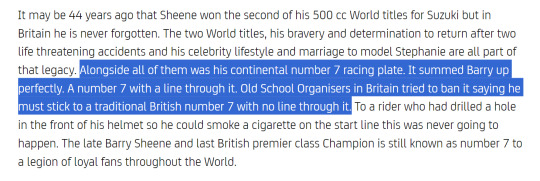
sheene stuck with the 7 both after his formula 750 title and then after his two 500cc titles:


there's some ways in which sheene is kinda the prototype of the modern rider, and he was the first to reap the benefits of having a distinctive number associated with him
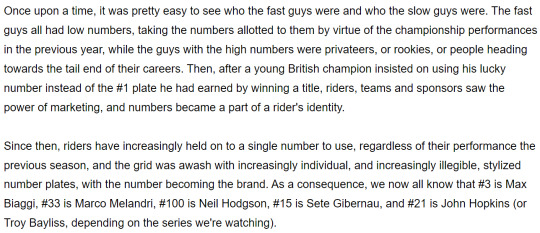
in the eighties and nineties, it was all back to number one plates - but then of course another rider decided to break with tradition
incidentally, the generally purported story for why valentino took the number 46 is that it was his father's number. if his autobiography is to be believed, the truth is a little different:
I am Valentino. Graziano chose that name for me because he wanted to honour the memory of his best friend, who drowned at sea, near Pesaro, at the age of eighteen. The fact that St Valentine's Day is just two days before my birthday was also a reason. Number 46 originated when I raced minibikes. I was on a team with two kids from Gatteo a Mare, Marco and Maurizio Pagano. They are the brothers who lent me the Aprilia 125, which I used for my debut at Misano. All three of us had number 46 because we raced in three different categories. They too loved Japan and Japanese riders. One day we were mesmerised by a wild-card entrant at the Japanese Grand Prix who pulled off the most amazing tricks and seemed to have no fear whatsoever. He was number 46. And from that day on, so were we. For me, that lasted until I moved up to the Italian championship and, later, the European series. But when I finally made it to the world championship, I was asked to choose a number. I discovered that 46 was Graziano’s number when he won his first Grand Prix on a Morbidelli 250cc, back in 1979. Which was the year I was born. That’s why I decided that I, too, would be number 46. For me that number represents my career and, partly, my life. It certainly symbolises my massive, incredible, adventure.
so valentino was only the second premier class rider who stuck with his number. the norm of just following the previous year's standings to choose your number was kinda starting to die out in the late nineties anyway. by 2002, when valentino was defending his title for the first time, if you look down the list it's basically personal numbers all the way. still, valentino was the one to break tradition for champions - the first to do so in a couple of decades. valentino did also know sheene personally as a result of the link through his father, who was a friend of sheene's and had raced him:
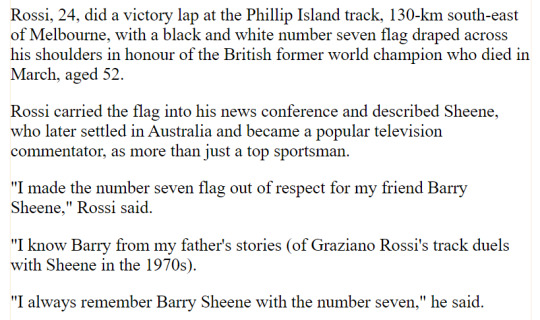
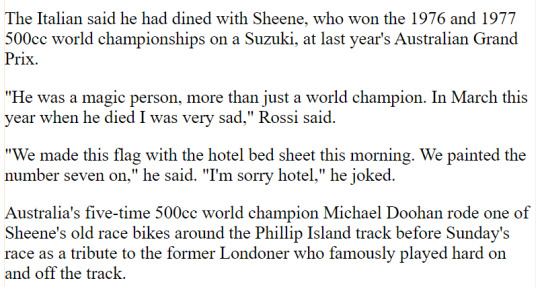
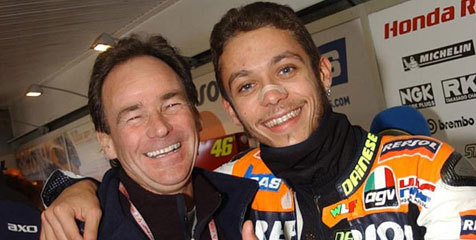
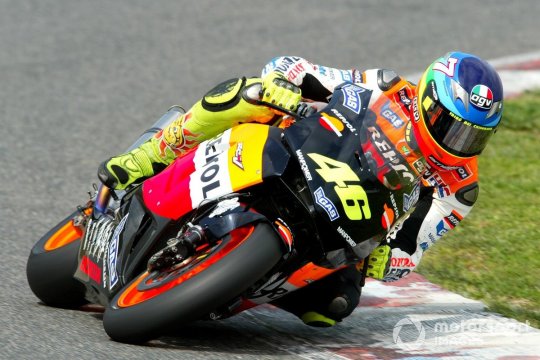

^valentino with sheene, valentino wearing a tribute helmet with the iconic '7' on it after sheene's passing (also with the rainbow helmet colours and the word 'pace' or 'peace' on the back during the 2003 invasion of iraq), and valentino's 2005 championship celebrations for his seventh title, his shirt again featuring sheene's seven
hayden didn't follow valentino's example and instead went for the number one plate in 2007. casey made the same choice for the 2008 season, then jorge in 2011... so for a hot moment it really did look like valentino had been just another blip. if anything, the trend was going the other way, with a couple of high profile instances of riders who hadn't won the title rejecting their established numbers:
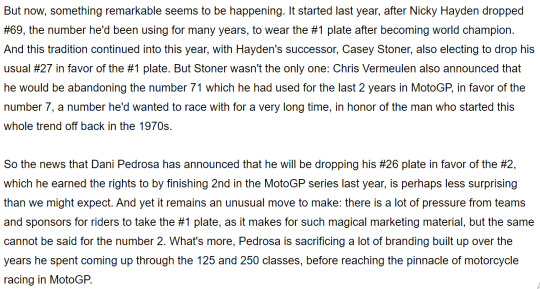
this particular trend didn't catch on, and from 2010 onward dani decided to just stick with the 26. because all the non-valentino aliens just couldn't stop faffing about with their numbers, 2010 is the only year in which all four aliens are actually concurrently running the numbers we most commonly associate them with
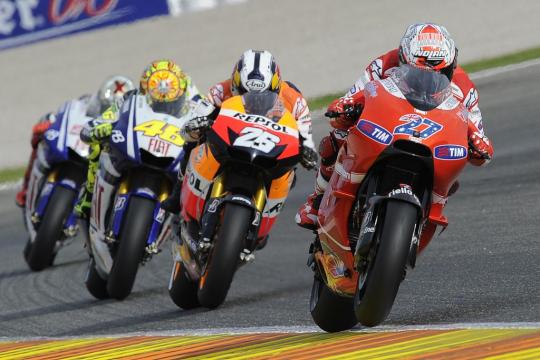
then, by 2012 apparently people were starting to get a bit superstitious about the number one plate. here, from an interview with casey:

the idea is that you can't defend the title if you're sporting the number one plate. which is true! in the 21st century, three guys chose the number one plate, and they defended their titles a grand total of zero times. one bloke stuck to his number, and he defended his title five out of seven times. so yes, it is technically correct that nobody with the number one plate had defended their title, though it is equally true that nobody not called valentino rossi had defended their title. I suppose we'll never know what the bigger factor was
anyways, if picking the number one plate was already a sure thing before, I reckon this sort of silly talk about 'jinxes' would have made casey even less likely to change his mind for 2012. not only is he stubborn, but he also takes an extremely dim view on superstitions
That race was the twelfth in a row that had been won by a rider not starting from pole, which was a new record. People were making a big deal about it and questioning whether, psychologically speaking, it wasn't a good thing to qualify on pole position at all. Maybe to the superstitious riders out there it had become an issue but I have never allowed myself to be affected by outside influences like that and I put an end to the stat by winning from pole in the next round at Laguna Seca in California. It is amazing how many riders have superstitions, which to me are completely ridiculous. Pretty much every one of them has a little mascot or a lucky pair of undies that they once had a good result in and have been stuck with ever since (so to speak!). Superstition is basically just fear and as an athlete my view is that by allowing it to enter your mind you are effectively handing over control. My approach has always been to deliberately tackle it by doing things differently to the last time, just to make sure I don't get into a restrictive habit. Some riders look at their qualifying position and think, I never go well from fifth position, or arrive at a circuit thinking about past results there and say, 'I've never done well here before, it's not my favourite circuit.' You have to be in the mindset that every day is a new day, a new set of circumstances. Every corner is different, every situation is different, and if you are not prepared to open your mind to that then you will always struggle more than necessary. You might have been through one particular corner a thousand times before but with a slight change in temperature, a new bike, a different tyre or a rider trying to pass you on the inside it becomes a completely different challenge and you have to be ready to deal with that.
given that casey is like, neurotically anti-superstition - well, he was probably always going to do the same thing as he did in 2008, but now he definitely would never just stick with his number. unlike jorge... who did change his mind, having run the number one plate in 2011 - but decided against making the switch in 2013. funnily enough, this did not help him defend the title. the eventual 2013 champion ended up also opting to stick with his number... and, well, marc's title defence went a little bit more smoothly. after jorge's 2015 title, he once again stuck to his 99, while marc has used the number 93 throughout his career. by the time you get to 2020, it's easy to have a warped perception of how common it is to keep your number. if you're born in, say, 1997 or later, you think it's basically the done thing to stick to your number, and it's really only a few outliers who use the number one plate. but even in the 21st century... it's really just valentino and marc who were doing it, plus jorge two out of three times. but between the two of them, they sure were winning enough of the titles to make it feel like the established norm
by this point, there really was a bit of a superstition about how the number one plate was 'cursed'. obviously, this wasn't actually a 'curse' as much as it was 'the dominant force in the sport in the noughties decided this number one plate thing wasn't for him and the dominant force in the 2010s who also happens to a massive fan of the other guy also decided not to make the switch either so that probably explains it'. it's not 'you won't defend your title if you're sporting the number one plate', it's 'you won't defend your title if your name isn't valentino rossi or marc marquez'. but obviously, sports drives people insane, so it was always going to be something that prompted a lot of speculation until someone finally managed to defend the plate
following his 2020 championship, mir didn't depart from the new tradition, with a suzuki video to announce his decision:

and fabio did likewise after his 2021 title:
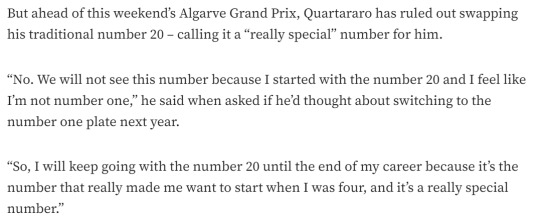
obviously, sticking to their numbers didn't actually help joan and fabio defend their titles, and after his 2022 championship it was pecco's turn to make the choice. pecco went about this in the most pecco way imaginable, with just a touch of public hand-wringing about the whole thing:


just as a quick reminder, before pecco there had been 28 premier class champions. five and two thirds decided against the number one plate - sheene, valentino, marc, joan, fabio, and jorge twice. "I have always been fascinated about riders with number one" describes something that until very recently had been completely normal. not even remotely noteworthy. cheers valentino
eventually, presumably after some extremely extensive introspection, pecco decided to go for the number one plate:


and also this:

and also this (look he's got a lot of thoughts on the matter, please allow him):

and talking about defending the number one:

pecco has continued talking about it sporadically since then. he's spoken about it in the context of defending his title, which as he points out he can only remember marc and valentino doing:

and then the pressure inherent to sporting that plate, from after he'd successfully completed his title defence:
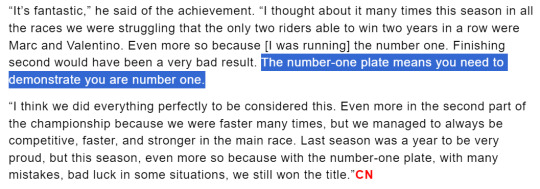
hm. right. let's unpack
the thing about this whole 'running the number one plate' business is that in motogp, each rider's individual choice has to be read with that history in mind. for many years, this wasn't even really a question... it's just what you do when you win the title. sheene was the rebel, the one who decided to do things differently, who wanted to be associated with his very own number. and valentino, who himself knew sheene and was already attached to his own number and has always had a good sense for personal branding, decided to stick with 46. of course, valentino being valentino, he's inescapable enough within motogp that ever since he made that choice, every single champion after him has had to actively make a decision one way or another
so you've got jorge, who had used the number one plate in his title defence during his 250cc campaign in 2007 - and also used it in 2011 as motogp defending champion. he ended up changing his mind for his following two campaigns... remember, he only started using the number 99 in 2009 after his fractious split with his manager during 2008 (see more on numbers lore here). here was what he said about his decision in 2011:
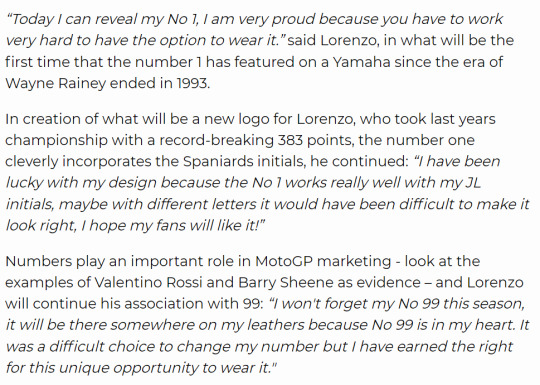
versus his decision in 2015:

jorge in particular does of course have a bit of a complicated relationship with the numbers he's used during his career - and unsurprisingly he's clearly put quite a lot of thought into the whole matter. he's determined to still have the number 99 represent him in some way even in 2011, while also thinking about how he can integrate the number one into his initials - and since it's jorge, of course it's particularly important that his fans approve. he "won't forget" his 99, it was still on his leathers because it's still 'in his heart'... but he explains it by saying he has "earned the right", that it's a "unique opportunity". then, a few years later, his main cited reason for sticking with the number 99 is how it 'represents' him
very much a question of identity, then, something about how jorge made the choice to use the 99 and how it was an expression of liberation for him... he was tempted by the number one once and only once - a statement in itself, following on from jorge's title win in 2010 where the oppressively popular defending champion had been taken out of contention through injury. jorge says he's 'earned the right' because he feels like he deserves it and he wants to tell the world as much. did his failure to defend the title play into his decision not to run the plate again or did he just decide it wasn't really for him after all? did he realise he had grown so attached to the number 99, what it symbolised to him, that he didn't want to give it up again? or did he just realise it was better for personal branding?
last year, here's what casey had to say:

it's fun how the perception of it has changed so drastically, hasn't it? now it's kinda the brave decision to take it... and that's mainly the legacy of two blokes who happened to monopolise this century of racing and decided to make their numbers their own (you may have noticed that there's considerably less material out there on why they made the choice they did). it's gone from something that you just sort of did automatically to something that puts a bit of a target on your back. because that's the subtext, right - everyone wants to 'take the number one plate'... which obviously they do anyway, but all this talk of curses and jinxes attempts to give it a bit of extra weight. is it presumptuous to take that number? valentino and marc made the call to stick to their numbers - and years later it's become a statement to deviate from that path. in that fabio quote above, in context he's really just trying to say he feels like he's the number 20 and nothing other than that - but "I feel like I'm not number one" is still a teensy bit loaded. how did marc's injury affect the choice made by those in his absence?
casey is unsurprisingly very firm on the whole thing, "you are world champion and you should be wearing number one". as if doing anything else is shying away from this duty. defending the title is another "challenge" that he says he likes - almost like a way of putting extra pressure on himself. though in a different interview, casey also says this:

just a number after all, then? it's also interesting how they frame it in different ways, isn't it? for casey it's "recognition" of an achievement, for jorge it's something you've "earned"... and for pecco, it's something you "need to respect". it's about something that puts "pressure" on you... perhaps that's partly because so much of the discourse about the number one plate has become about defending the title (or failing to do so), but pecco discusses it more as a responsibility than something he deserves. you can tell that it's clearly preoccupied him for a while - it's something he's "fascinated" by, he's "admired" people who have done it, he's "always loved it". for both casey and pecco, part of it seems to be about respecting the history of all the blokes who have used the number in the past, like it's an act that pays tribute to that heritage. you'd think this shouldn't have been such a tough choice in the first place, wouldn't you? goes to show how much of a break with tradition it's become - tradition, of course, that was really started by pecco's own mentor. would it be that surprising if that's part of the reason for the reticence? and, at the same time, would it be that surprising that his mentor's long shadow might make him feel like he needs that big and bold number one? what does pecco think it's saying that he went a different way? all this public hand-wringing just because he's breaking a trend
for jorge, the number one plate was a public declaration that he'd made it, naysayers be damned. to pecco, "the number one plate means you need to demonstrate you are number one". it's like giving yourself a point to prove... is it mainly a matter of pride or giving yourself something to live up to? both of them go to great pains to stress their continued attachment to their original number, how they're continuing to integrate it into all their cute designs... and that is something that has changed pretty definitively - not entirely as a result of valentino, but around the same time as valentino emerged as the figurehead of the sport, and he's certainly a big part of it. even the riders who go with the number one still want to have their number and to be known by it. the numbers have become such an integral part of branding and rider identity that riders want to make clear how important they are to them, whether they stick with the number as defending champions or not
at the same time, the fact that taking the number one plate has been de-normalised means that this decision places extra focus on the challenge of defending the title. pecco might not frame his choice in opposition to valentino and marc's to keep their numbers, but he does repeatedly link it to how they alone had been able to win successive titles. for him, then, it becomes an indirect way of living up to a legacy - counterintuitively by doing the opposite of what they did. "since I remember, was just marc and vale have repeated the title" “I thought about it many times this season in all the races we were struggling that the only two riders able to win two years in a row were marc and valentino"... that's what he's trying to live up to, this simultaneous source of inspiration and insecurity. are you lacking confidence if you need to see the number one to believe yourself that you are the number one? or is it conversely shying away from something you have rightfully earned if you can't bring yourself to take the plate? is it an expression of ego if you think your personal number is more meaningful than the number one could ever be? personal branding decisions aside, wouldn't manufacturers much rather you display the number one plate proudly on their bikes?
kind of remarkable, isn't it? it should be such a simple choice... and yet. not only is it now a question of branding and identity, but within motogp it's also become one of how you relate to the legacy of two specific riders. maybe it'll gradually become more common again to take the plate - after all, the curse has now been broken. or maybe it will be the source of much hand-wringing forevermore... we shall see. we shall see
#personally I'd always keep my own number lol. but I also think pecco specifically made a good call#though maybe it would've helped to do a little bit less public introspection and hand wringing and soul searching#poor little ferret wants a number one on his bike. needs to write essays justifying it. buddy it's fine who cares#batsplat responds#//#brr brr#does it bother anyone else that valentino doesn't actually use a continental number seven? no? just me?#some of sheene's 7s didn't have the dash. which. there may be a good reason for this but it doesn't quite feel like ideal branding-wise#taking a massive sharpie to valentino's title winning shirt#incidentally schwantz generally stuck to his 34 until he won the title. thought it interrupted the flow too much to mention it but#//currt#//at
56 notes
·
View notes
Note
Hey V! I was looking into Blood Canticle to decide if i want to read it and ... Wow! I just read this letter Anne Rice wrote to amazon reviewers, I'm assuming when it came out and man.. she was wild ( affectionate)
"...But your stupid arrogant assumptions about me and what I am doing are slander. And you have used this site as if it were a public urinal to publish falsehood and lies. I'll never challenge your democratic freedom to do so, and yes, I'm answering you, but for what it's worth, be assured of the utter contempt I feel for you, especially those of you who post anonymously (and perhaps repeatedly?)"
I'm sure you have read it before, but if not: https://www.tumblr.com/sizeofyoursoul/773586129730551808/anne-rices-infamous-amazon-review-of-blood?source=share
ummm i think i might revisit this one at a later date.😁
Hey!
Oh yes. I'm familiar with her Amazon rant. For all her positives (and her negatives), I can say unequivocally Anne was a piece of work, indeed. 😁
The thing is I hated Blood Canticle the first time I read it, and I had to sit for two years (many fans for much longer) with that being the last book in the series. There was something so tragic about Lestat in it and it's only since rereading it that I came to appreciate it for what it is, which is Anne via Lestat coping with losing Stan.
It always struck me that Anne started the Chronicles after Michele’s death and ended them after Stan’s death by giving Louis and Lestat a happily-ever-after. Stan died in 2002, and Blood Canticle came out in 2003.
If you read Blood Canticle, you’ll know what I mean when I say it was off from the rest of the series. Lestat was Lestat, but like I said, there was something tragic about him because, at the same time, he was very much not Lestat. He felt very jaded, very tired, very much done with everyone’s bullshit, and merely searching for some semblance of peace or fulfillment or love. His light was dim. Considering Anne would’ve been reeling from losing Stan while writing it, like I said, Lestat’s broken voice makes perfect sense. Lestat wasn’t himself, because Anne wasn’t herself. She was grief-stricken, which interestingly takes us back to the beginning in which Lestat in IWTV wasn’t the same Lestat we came to know and love throughout the decades afterward.
It also makes sense why it was another decade after Blood Canticle before Anne could properly visit Lestat and Louis again and when she did, she reunited them as husbands, finally at peace with themselves, finally fulfilled, finally home with each other. It was the reflection of how she would’ve wanted things for her and Stan, but also a reflection of Anne making peace with all the facets of herself, because Louis was always her while Lestat (originally meant to represent Stan) transformed into the one she wished she could be. And again, that aspect is fully realized within the Loustat dynamic as Louis wishes he could be like Lestat and have his same strength and fire. It was just such a lovely balance of threading the two characters together.
Also? Blood Canticle contains one of my favorite Lestat quotes — "Beware of ordinary life. Reach for something finer, greater.”
He writes that in a letter towards the end of the book, and I always felt it was such a moving scene with Lestat, broken and bereaved, selflessly trying to pass on his little pieces of wisdom he'd gained throughout all his years.
#interview with the vampire#iwtv#interview with the vampire amc#iwtv amc#amc interview with the vampire#amc iwtv#iwtv 2022#lestat de lioncourt#anne rice#blood canticle#vampire chronicles#the vampire chronicles
28 notes
·
View notes
Text
Actor Darren Criss Discusses Bringing ‘Maybe Happy Ending’ To Broadway

[UHQ] Darren Criss attends the "Maybe Happy Ending" Broadway photo call at Tempo by Hilton New York Times Square on September 16, 2024 in New York City. (Photo by Dia Dipasupil/Getty Images)
“An original, new musical on Broadway - can you believe that?”
That is the excitement that Emmy and Golden Globe-winning actor Darren Criss brought to our new conversation this week about his Maybe Happy Endingproduction coming to Broadway, with previews starting October 16 and its opening night set for November 12.
Previously known for his memorable performances on hit television series like Glee and The Assassination of Gianni Versace: American Crime Story, as well as his previous involvement in celebrated live theatre productions including American Buffalo, Hedwig and the Angry Inch and Little Shop of Horrors, Criss, 37, is now preparing to play Oliver on-stage, a robot referred to as a Helperbot 3 that has been long retired and is considered obsolete, now spending his days in isolation in his one-room apartment on the outskirts of Seoul, South Korea. That all changes when Oliver forms an unlikely connection with a fellow Helperbot neighbor named Claire (played by Helen J Shen).
I sat down with Criss in New York City, New York, just down the street from his Maybe Happy Ending’s upcoming Belasco Theatre venue, wondering first how this production and his interest in this rather unique character of Oliver initially got on his radar.
Criss said, “Two men that I’m very grateful for in my life, Mr. Jeffrey Richards, whose the lead producer of the show, who I have had a long standing relationship, as far as doing theatre on Broadway is concerned. We came in contact more than a decade ago when we were doing a reading of American Buffalo, which I would do basically a decade later with him. He’s always sent me cool things and cool projects. Separately, Michael Arden has been a friend for a very long day. He has been in sort of more my friends circle than my professional circle - I went to college with his husband. I’ve seen almost every single thing he’s ever directed - I think I missed one thing. These are two guys that I have always admired and appreciated, as far as their output was in the theatre community. The Venn diagrams became one circle when Jeffrey sent me an email about this several years ago. Michael was a part of it and wherever Michael is, I run!”
Being a musical set in Asia and Criss being half-Filipino himself, with several other Asian artists working alongside him on this project, I was curious if Criss takes extra pride in being able to tell a story like Maybe Happy Ending live on on-stage and soon get to share it with our world.
“Of course, I do,” Criss said. “There’s obviously a huge amount of personal ‘woo-hoo’ to the idea that this is predominantly an Asian, Asian-American company - on-stage and off-stage - but I’m always weary to categorize this as an Asian show or an Asian story. This production happens to celebrate and represent Asian-ness to a really fun degree, but there’s so much universal-ness to it and accessibility to the story that I hope in perpetuity, this is something that can be done anywhere, with anyone, at any time. I don’t think I’m trying to say that to be inclusive of all things and people. It’s me being pragmatic - this is a story about a future world - about sentient robots that really doesn’t have any particular cultural background, other than the cultural background of technology, which is based in the human experience.”
Criss added with his Maybe Happy Ending collaborators in mind: “I think all of us enjoy sharing our sort of Asian heritage with each other, and obviously, that’s a large spectrum - that’s not one thing. So, there’s already an eclecticism between all of our Asian experiences that’s fun to bring to the table. Yes, it does take place in Seoul, it is from South Korea, but this show has already had great success in Korea, Japan and China - which while all Asian, make no mistake - are very different cultures. So, if that’s any indication of the ability for this show to resonate with all people, then I think we’re in good shape.”
He is not the only person on this production embracing this collective experience. Shen says of interactions so far with co-star Criss, “I think he’s been really generous with his energy and his time. As a person who, I can sometimes feel a little young in this space, I feel like I’m new to this. I’m making my Broadway debut - there’s a lot of imposter syndrome and words of doubt that can be flooding my brain. He is always the first person to say, ‘You belong here. You deserve to be here. You’ve worked very hard - and just breathe and take up space.’ That has been so invaluable to have somebody understand what this feeling can be, of how scary and overwhelming it can be, and be like, ‘This is an exciting moment! We’re present here - let’s soak it in!’ He’s been such a champion of that.”
Arden, who is the director of Maybe Happy Ending, said of Criss, “Darren is so incredible. He can do everything - it’s really somewhat annoying. He understands things from the inside out and the outside in - and so, to meet him and the rest of this company, honestly, in the process, it just means that we get to kind of like create this thing together. It’s not like my vision upon them - it’s something that we can all create together.”
Hue Park and Will Aronson, who have led the way with the music and lyrics in Maybe Happy Ending, have nothing but respect and admiration to say about Criss.
Park said, “I think he’s just perfect for the role - his sense of humor, his acting skills, his sensibility creating this character based on our text and music. It’s just so exciting to see.”
Aronson added of Criss: “He has a boyish innocence, which really is perfect for this show - and his creativity. The great thing about live theatre is that it’s already true in the rehearsal room - it’ll be true in the theatre, once it’s running - that the actors are creating it every time they perform it, meaning that the jokes are different every time, even if the text is the same. The chemistry is different, depending on what the actors are creating in their scene together. The cast is just incredible, so of course, they’re finding that and they’re creating that.”
Dez Duron, who plays Gil in Maybe Happy Ending, said of Criss’s character and his performance so far, “Oliver is a really big role - he’s on-stage pretty much the whole time. I’ve been loving watching him tackle this role, and explore it and discover it. I’ve been a part of this project for five years, so watching [Criss] kind of like get into the script and the changes he’s bringing to it and the new life he’s breathing into it has been really inspiring to watch.”
Marcus Choi, who plays James in the new musical, said of his co-star, “So, Darren Criss has always been on my radar - we’re all very familiar with his body of work. He’s been incredible for so long, but when I got a chance to go to Elsie Fest last weekend, I really got to see him shine. He is just such a force on-stage and just oozes charisma. I mean, I’ve always been a fan but I just have a deep appreciation for him now and just how hard he works.”
Even though this can be perceived as a sci-fi production, being that it centers around robots that are no longer seen of use in the world, I asked Criss if he sees the parallels towards humanity within our real world with this story about love and still finding connection.
Darren said, “Yes! The Helperbots in our show are somewhere between servants, pets and children - and old folks. If we did a show about old folks in a home, it might hit a little too close to home - it might be a little too on the nose. I think some of the most human themes that I’ve been taken with are stories about cartoon animals or toys - things that represent the human experience in a way that I actually am more likely to internalize and pick up on. So, I think that’s what one of the great devices of the show is - to sort of displace the human experience through that of a sentient robot. Yes, we all - surprise, surprise - we all have a shelf life. We are all at some point going to be, in the eyes of society, obsolete in some respect. We all have a battery life. This is less talking about the idea of mortality and concept of transience, and the idea that we can only spend our battery life on so much, thinking about What are you going to spend your battery life on? So yes, that is going to hit audiences, hopefully, in a profound way.”
As I concluded my conversation with Criss about his Maybe Happy Ending Broadway production, I wondered what Criss would want to say to Oliver, after embodying him so far in rehearsals, continuing to better understand the character and preparing to share his compassionate story with our world throughout the fall season and beyond.
Criss said, “The same thing that I think hopefully the show will posit, which is - It’ll be okay. It’ll always be okay.”
#darren criss#michael arden#helen j shen#marcus choi#dez duron#hue park#will aronson#maybe happy ending#maybe happy ending bway#forbes#press#sept 2024
29 notes
·
View notes
Text
Like many non-Austrians, I first discovered Vienna’s winter ball season through German-language tabloids. The celebrity-studded Opernball (Opera Ball), the season highlight, is widely covered in the German-speaking world, where it is streamed live on TV and culled for clickbait online. Glittering details are consumed with a mix of aspiration and resentment: debutantes, tiaras, and pricey opera boxes (starting cost: $14,000)! The only sign of the 21st century is a name-drop such as Kim Kardashian, who attended in 2014.
The Opera Ball, I have since learned, is only the tip of the iceberg.
More than 400 formal balls are held in Vienna each winter carnival season. This February, I visited three. The tradition combines the public festivities of the medieval carnival with the legacy of the “Waltzing Congress” of 1814, better known as the Congress of Vienna. Held just a year before Napoleon’s final defeat at the Battle of Waterloo, the Congress—a series of diplomatic meetings between leaders of various powers opposing France—aimed to reinstate Europe’s monarchies and hash out the continent’s post-Napoleonic order.
Its more immediate effect, however, was to transform Vienna into a giant ballroom.
With representatives from Prussia, Austria, Great Britain, Russia, and France, as well as assorted royalty and nobility from across Europe gathered at the imperial Hofburg Palace, the prevailing atmosphere was that of a permanent “house party,” observed historian Dorothy McGuigan in her book The Habsburgs. The dance halls were packed, and the streets were filled with music and fireworks; to lubricate negotiations, Emperor Francis hosted evening balls and musical entertainment, including a concert featuring 100 pianos. The enduring epithet of the so-called Waltzing Congress stems from a quip by the rakish Prince Charles-Joseph de Ligne of Belgium, who proclaimed that “[t]he Congress doesn’t work; it dances.”
The Viennese ball season has been celebrated almost continually since 1814, breaking only for the two world wars and recent pandemic. In a country of only 9 million people, it draws more than 500,000 ordinary people out to waltz. Nearly every profession in Austria hosts its own celebration: A nonexhaustive season program includes the Police Ball, the Firefighters’ Ball, the Engineers’ Ball, the Doctors’ Ball, multiple farmers’ union balls, and the Lawyers’ Ball. Some of these dances, such as the Coffee Brewers’ Ball or the Hunters’ Ball, have outlived the imperial-era professions that they were created to celebrate. Others, such as the Ball of the International Atomic Energy Agency or the recently retired Life Ball—founded to raise awareness during the height of the AIDS crisis—are decidedly contemporary.
It was the improbable continuity of 19th-century traditions, however, that drew my attention. The frenzy of the waltz—still performed in the same ballrooms as in the imperial era—echoes a persistent anxiety for Europe’s over-touristed, economically uneasy, and politically pessimistic capitals: On a continent that relishes golden-era traditions yet finds itself slipping in the geopolitical world order, how do you face the future without romanticizing the past?
Viewed through this lens, the ball season refracts the flamboyant anachronisms of a region in transition. Dozens of guests and former debutantes—most balls include a debutante ceremony—described the events to me in terms of glorious contradiction. The balls, I was told, are elegant, tacky, rarified, intimidating, democratic, elite, ironic, gorgeous, decadent, tiresome, astonishing; they are both political and apolitical, accessible and inaccessible, international and decidedly Viennese.
This cacophony carried over to my own impressions. I saw tiaras and hoop skirts and a tattoo of the Sistine Chapel fresco framed in the V-line of a backless ballgown. Orphaned evening gloves and ostrich feathers drifted across the parquet floors of the Hofburg Palace; hair fixtures nested in updos like Fabergé eggs. I witnessed government ministers dance the disco and saw at least six debutantes faint.
I was told by veteran ball journalists that the publications I write for sound “serious and political,” and that a Viennese ball is neither a serious nor political event. A ball is frivolous, they said; a ball is for fun. I don’t disagree. But I also believe that a society’s attitude toward tradition shapes its expectations for the future—and how much that future should resemble the past.
Maryam Yeganehfar, the creative director of the Opera Ball, emphasized the balls’ capacity for rejuvenation and even escape. The carnival festivities were originally founded, she said, to give people “hope, life, enjoyment” in the weeks leading up to Lent, the 40-day period before the Christian celebration of Easter.
“[W]hy is enjoyment always framed as decadence?” Yeganehfar asked.
At a time when Europe’s post-COVID-19 pandemic headlines—on immigration, war, inflation, right-wing extremism, climate change, energy crises, and strained trans-Atlantic relations—often give reason for pessimism, the balls are a testament both to the temptations of nostalgia and to the resilience to party on.
The Science Ball
The first ball I attended was the Ball der Wissenschaften (Science Ball). Oliver Lehmann, who has served as the event’s director since 2014, is aware of the season’s appeal for foreigners: “For a lot of our friends and guests from the U.K. and the U.S., but also from Switzerland and Germany,” he said over a Zoom call before I arrived, “a ball sounds like a sugar fairy tale from a Walt Disney movie.”
Lehmann admitted that there is some truth to that image. But the balls might be better understood as the “Austrian version of a huge networking event,” he said. Even socialists once held balls; in the 1860s, party members at the Workers’ Ball waltzed wearing bright red ties, attracting attention from political censors.
The Science Ball, for its part, brings together representatives from Vienna’s nine public universities, its expansive network of private and vocational colleges, and numerous research institutions to celebrate—and boost—the city’s reputation as a center of innovation.
The Science Ball also has a unique, quasi-political agenda. It was first held in 2015 in part to undercut the claim of the far-right Akademikerball, or Scholars’ Ball, to “scholarship,” Lehmann said. The gathering of right-wing fraternities is organized by the nativist Freedom Party of Austria (FPÖ). In 2014, the annual protest against the Scholars’ Ball turned violent, resulting in injuries and damaged property.
Today, the Vienna government offers the Science Ball its palatial city hall free of charge, signaling its continued support for the ball’s mission and helping to lower ticket prices for attendees. Regular entry is 100 euros, or $107, while students can attend for $43. It’s a win-win arrangement: Scientists celebrate field achievements; students attend on the cheap; local government discredits nativist misinformation; and a city whose reputation for innovation is often overshadowed by its cultural-historical attractions gets to advertise its technical heft.
To Lehmann, the Science Ball’s focus on contemporary Vienna is evidence that the balls have “nothing to do with nostalgia.” When I asked if the recent rise of right-wing nativism in Austria (the nativist FPÖ came in first in Austria’s elections for the EU Parliament this month and is currently polling at more than 30 percent ahead of elections this fall) has begun to politicize the balls, he replied, “Only counterintuitively, because we’ve never sold out so fast.”
When I arrived, the Science Ball proved to be many balls in one. The dancing unfolded through a series of rooms across three floors of the city hall, each with its own band and musical style. The main ballroom, lined with chandeliers and debutante couples in tuxedos and white gloves, opened onto a grand stairwell decked out with flowers. Beyond this lay the sultry tango room, followed by a baroque cloister where a cover band played “Que Será, Será,” and a ground-floor disco crowded with younger guests. The latter venue is where I spotted Austria’s federal climate minister briefly boogying to “Stayin’ Alive.”
This year’s ball was dedicated to promoting more effective strategies for communicating the threats posed by climate change. There were leaflets floating around with a carbon-emissions logic puzzle, plus a cryptic exhibit devoted to whales that featured a fog machine. In the flagstone courtyard, an 8-by-8 meter inflated cube (about 25 feet across), reminiscent of a giant bouncy house, offered a visual representation of one metric ton of carbon emissions; the average European Union citizen emits between 7 and 8 metric tons of carbon dioxide each year.
The importance of these issues to the Austrian government’s agenda was underscored by the presence of Vienna Mayor Michael Ludwig and Leonore Gewessler, the federal minister of climate action, environment, energy, mobility, innovation and technology. On the main stairwell, the politicians posed for selfies with students, many of whom expressed interest in climate-related issues. The balls can facilitate this sort of direct constituency engagement. But Gewessler also warned against overstating the events’ political importance: “A lot has changed since the Congress of Vienna,” she said. “As it should in an open democracy.”
She is right: Things have changed. Many young women—including the president of the Vienna student union—took advantage of the gender-neutral dress code, donning smart tuxedos and white ties. The organizers “don’t give a damn” about who wears what, Lehmann said, as long it’s evening attire. A couple of biologists I spoke to with roots in India, who now work at a Viennese research outlet, appeared in a tux and emerald sari repurposed from Mumbai’s wedding season. (The fact that I, too, had worn my wedding dress became a bonding moment.)
A group of American exchange students from St. Olaf College in Minnesota had bought their outfits at a budget shop in nearby Bratislava, Slovakia, about an hour away by train. They were starstruck. “It’s amazing,” one said. Another chimed in: “But the drinks are really expensive.”
The balls’ class dynamics are the subject of much local scrutiny. Open any Austrian newspaper in January and you will find an announcement about the average cost that each guest spends per visit: $371. About a third of that is paid for entry, and the rest on attire, taxis, styling, and infamously exorbitant concessions. Local headlines decry $15.50 pints and $17 Wiener sausages. In 2022, an Austrian state governor went viral for her tone-deaf tip that constituents restrict themselves to owning three—rather than 10—ballgowns.
The considerable spending associated with the balls is also a source of revenue that working-class Viennese—taxi drivers, caterers, dance instructors, and hairdressers—depend on. Norbert Kettner, the CEO of the Vienna Tourism Board, an independently run organization that also receives funds from the city, pointed out that the hundreds of millions of euros that this year’s 540,000 guests spent on the balls filter back into the local economy. At a “styling corner” at the Science Ball, where guests can stop by for touch-ups, one freelance makeup artist estimated that she makes more than half her annual income during the ball season.
Later that evening, my taxi driver explained that he organizes his night shifts around the ball schedule, which he pulled up on his phone; there were five events that night alone. When I asked whether he’d ever attended a ball himself, he laughed: “Just outside!” That is, at the taxi stand.
It’s natural to wonder whether the 19th-century aura does more to promote or impede democratic norms, especially when far-right nostalgia—such as that channeled through the FPÖ-sponsored Scholars’ Ball—is on the rise. The object of that nostalgia is pre-globalization Europe. There is a perception that the continent’s status has declined since then: The eurozone’s respective share of the global GDP, for example, has fallen by more than a third since 1960. On the other hand, Europe remains comparatively wealthy; Austria’s per capita GDP is the 14th-highest in the world, according to International Monetary Fund estimates.
Meanwhile, as war rages on in Ukraine, Sudan, and the Middle East, the EU Agency for Asylum predicts that 2024 could bring the highest number of asylum-seekers to the bloc since 2015, when 1.3 million refugees arrived in Europe, about half of them from Syria, Afghanistan, and Iraq. Just before this year’s carnival season, the 35-year old Austrian right-wing extremist Martin Sellner presented a bone-chilling “remigration” plan for migrants, asylum-seekers, and “unassimilated citizens” at a November conference of far-right actors near Berlin. He has since been banned from entering Germany.
The balls appear to offer a welcome respite from these thorny challenges—if they don’t feed back into the well of nostalgia from which these troubling political headlines are sourced.
Around midnight at the Science Ball, a psychology master’s student from Bavaria took a break from her heels on the red-carpeted stairs. She told me that this was her second time attending the event; she and a friend visited last year as well to celebrate the conclusion of a dreaded statistics exam.
“We love it,” she said, gesturing at the glittering crowd of young people posing for pictures behind us, “but we also hate it.” In her view, ball culture is elite and exclusive, reserved for the rich—but more so at other events than at this one. All the same, she conceded, “Why not feel super special? For 40 euros, look what you get.”
The Coffee Brewers’ Ball
Hosted by the Club of Viennese Coffeehouse Owners, the Kaffeesiederball, or Coffee Brewers’ Ball, is another of the season’s most-anticipated events. It celebrates and promotes the history of Vienna’s famous coffeehouse culture, which was inducted into the UNESCO list of intangible world heritage practices in 2011. Were there a people’s choice award for balls, the Coffee Brewers’ Ball would likely win; multiple guests, none of them coffee brewers, told me that it’s the most beautiful ball of the season.
The stately Hofburg Palace, where the ball was held, took on the atmosphere of a black-tie nightclub. Attendees—whose ages spanned from 18 to 80—had traveled from Munich to celebrate a 40th birthday; from Dubai, for the glamour; from Austria’s southern Carinthia region to see the scheduled performance by the Vienna State Ballet; and from northern Austria, to see a disco cover band (called the Bad Powells). Most were from Vienna itself. They had come to see the Hofburg, whose status as the former imperial palace lends the events held there a particular lure and elegance.
The guests were there, above all, to dance: the polka, the quadrille, the polonaise, and the tricky Viennese “left waltz,” in which couples follow a double rotation, revolving on their own axes while simultaneously orbiting the room, like planets hurtling around the sun. The dancing spilled from the main ballroom into gold-trimmed apartments leading deeper and deeper into the palace; I finally reached a dead end at the storied Redouten Rooms, which ball-enthusiast Empress Maria Theresa renovated in 1748 to better accommodate waltzes and masquerades. That evening, they had been furnished with neon lights, a gin bar, and a DJ spinning techno.
The balls have long dramatized a broader European tug-of-war between democratization and aristocratic control. From the 16th to 18th centuries, the monarchy strove to regulate, then ban, public masquerades and dances in the weeks leading up to Lent. The prohibitions were issued on the grounds of mischief (murders were known to be committed from behind the anonymity of carnival masks) and the threat of popular uprising.
Meanwhile, the nobility began to host their own masquerades in private ballrooms such as the Redouten Rooms. When Emperor Joseph II opened these rooms to the nontitled public in 1772, the nobility retreated once again to exclusive spaces, where they could better monitor the guest list (and, by extension, the marriage market). The same trend followed the rise of public dance halls at the turn of the century, when every profession began to hold its own celebrations.
Today’s balls are also increasingly international and cross-cultural. “Twenty years ago,” a 40-year-old Viennese guest told me, “you wouldn’t see so many international guests.” This year, he had brought two friends from Paris. As the night wore on, I also met a fashion journalist from Switzerland, a reporter from South Korea, and a correspondent from Munich. In one of the palace’s many golden bars, a local journalist pointed a camera at two models posing in a black tuxedo and a frothy pink gown. When I asked what the photoshoot was intended to advertise, he gave a cheerful answer: “Vienna!” The staged images will run in an international travel magazine.
For European states, the continent’s golden era is readily monetizable through foreign tourism. In cities such as Barcelona and Amsterdam, the annual total of visitors outnumbers locals by more than 10 to 1, prompting some local governments to dissuade further travelers from coming. Today, tourism makes up almost 10 percent of Austria’s economy, the same share as for the eurozone as a whole, which also claims more than 60 percent of the world’s international leisure travel.
There are many reasons to be drawn to the continent; Vienna itself is frequently ranked as the world’s most livable city. Yet among locals, the pandemic, climate change, and geographic proximity to Russia’s war in Ukraine can contribute to a mood of perceived domestic decline.
One former debutante reflected on her experience with a contagious nihilism: “Europe is lost,” she said. There’s “Ukraine,” and “nobody has money. Everything is fucked, basically, so why not party?”
It is not the kind of sentiment that will make the travel magazine spread.
Despite signs of disillusionment, Kettner—the Vienna Tourism Board CEO—said that young people such as the former debutante have “rescued” the balls. The discotheques and increasingly gender-neutral dress codes are part of a concerted effort to appeal to younger generations.
It’s been successful: Debutante classes ahead of the balls, which draw from the under-30 crowd, are full at the city’s top dance schools. Post-pandemic participation across all ages has risen from 520,000 in 2019 to an estimated 540,000 in 2023. The challenge of keeping the ball season relevant is a microcosm for Europe’s overall challenge: How to protect proud cultural traditions while also making sure that they can keep up with the times.
The Opera Ball
This official state ball, the “ball of all balls”—Austria’s most beautiful, decadent, and exclusive event—arrived on the scene in the year 1935. It is a fundraiser, with revenues flowing to the Vienna State Opera, in whose building the dance is also held. In 2019, the event raised the equivalent of more than $1.1 million for the national opera and ballet.
In recent years, the Opera Ball has also developed a side reputation for celebrity antics. This is in large part thanks to Austrian reality TV star and businessman Richard Lugner; the reveal of his date is an annual tabloid event. In 2005, Lugner was accompanied by former Spice Girl Geri Halliwell, who, headlines gleefully reported, refused to dance with him. His other previous companions have included Pamela Anderson, Kim Kardashian, and Grace Jones. This year, he took Priscilla Presley.
A livestream broadcast of the ball is popular with viewers at home. This winter, more than 1.6 million Austrians and 1 million Germans tuned in.
The Opera Ball, with its outsized media footprint, also attracts dissenters. An annual demonstration that has been held on the same day as the ball since the late 1980s has become as much a part of the tradition as the waltz itself. Organized by the Communist Youth of Austria, this year, 400 to 600 people marched to the slogan “Eat the Rich.” More specific demands included a nationalized housing policy, the reinstatement of a national inheritance tax, and wage increases to keep pace with inflation.
The group’s media relations manager, Johannes Lutz, said that the protest stands against the inequity that the Opera Ball “symbolizes” rather than the ball itself. The minimum entry price of about $426 ($38 of which is earmarked for charity) is a point of contention; basic tickets for the season’s other exclusive balls range from $107 to $208.
Yeganehfar, who has served as the creative director of the Opera Ball since 2023 and also runs a successful local event production company, conceded that the ball “has its price.” She compared it to a major sporting event: Some fans will save up to attend, but many more will watch from home. (By comparison, the average ticket price to attend an NFL football game in the United States was $377 in 2023.) It is precisely because ordinary people “save up to be in this room” that Yeganehfar said she aims to make the Opera Ball so memorable.
“This is the most beautiful event in the entire country,” she said. “We should put it on a pedestal.”
The ball unfurled throughout the entire opera house—onstage, in the wings, in the basement, and in the many gilded bars and cafes—lending a night-at-the-museum giddiness to the evening. From a lobby erupting with Pink Floyd roses, arriving parties filtered through linoleum hallways and past dressing rooms usually reserved for singers and ballerinas. The dancing took place on the stage itself, which had been extended over the orchestra pit.
To debut at the Opera Ball, one breathless young debutante told me, is to occupy the same stage where the “the greatest singers in history” have performed.
The idea that the Opera Ball is something “you should see once in your life” is a sentiment that I heard from guests again and again. A couple from Berlin—a retired secretary and the manager of a hydrogen firm—said they were in attendance because Vienna is “the city of music.” Eight middle-aged women from Kyrgyzstan had arrived in matching pastel gowns after discovering the Opera Ball on the internet. Two Austrian students—a couple studying education and social anthropology, whose gelled hair and all-black palette gave the requisite dress code a punk twist—told me that they are usually at the leftist demonstration outside. This year, they’d saved up to attend the ball itself, saying, “[o]nce at the Opera Ball, the rest of the time at the protest!”
Onstage, I was asked to participate in a disastrous waltz. A ball veteran leading me through the polka, a step I do not know, insisted that the point of the Opera Ball is to escape reality. “For one night,” he said, “you don’t think about war or poverty. You just celebrate.”
But we were thinking about these issues—he mentioned them without my prompting. Awareness of the world outside was inscribed in the price of concessions, 10 percent of whose revenues were earmarked for an Austrian charity initiative in addition to the $38 earmarked from the ticket price. I saw three young men pass around a flask of liquor, a common workaround to the exorbitantly priced drinks. Exiting the stage, I dodged waiters rushing into private opera boxes with trays of petits fours and canapés.
This is about “tradition,” guests told me. It’s about prestige. It’s about attending the same ball as celebrities. (Later, I discovered that Italian actor Franco Nero was also in attendance.) It’s about “seeing and being seen.” It is, above all, about the illicit, dreamworld feeling of being where we’re not supposed to be: backstage at the Vienna Opera House and also, possibly, in the 19th century.
In the lobby, VIPs were being interviewed on live television. The sense that I’d fallen through the looking glass became more overwhelming when I stumbled into the basement, which had been transformed into a club. On a velvet sofa adjacent to the writhing dance floor lay a tulle hoopskirt, evidence of someone’s late-night costume change.
Like a hypnotist’s signal, it was my cue to head out and catch my early morning train.
Out in the real world, Yeganehfar’s comment lingered with me the most: “Why is enjoyment always framed as decadence?”
The taxi driver who picked me up outside of the opera house was originally from Poland. Our conversation drifted to the rise of right-wing politics in his native country. “History is turning back on itself,” he concluded, a reference to the ascendence of the far-right Law and Justice party in Poland and the accompanying decline in German-Polish relations. The observation compounded my sense of being drawn through multiple timelines at once.
By the time we arrived at the hostel apartment where I was staying, it was dawn. I exited onto the sidewalk and tipped my driver everything I had. Teetering in the sunrise in a pair of borrowed heels, I wondered if ball critics’ hand-wringing over decadence speaks less to a distrust of pleasure than to a profound sense of dissonance. Europeans still enjoy a quality of life that is the envy of much of the world, yet populists have managed to create—and spread—a narrative of a continent in imminent decline.
“Let us hope the future will be better!” the taxi driver said in parting. I found myself a little too eager to agree.
47 notes
·
View notes
Note
Hey as fellow horror fan am I curious of your taste in horror media?especially the given the unique horror route you have chosen take with elegy of an empire .
Hey!
I love love love this question. I'm putting the answers below a cut because of the laundry list of dark themes and spoilers.
So the earliest influence for me was The Twilight Zone (1959-1964). I first watched it as a kid and it's been delightfully haunting me ever since. I intend to watch it through again as I'm confident I haven't seen every episode and at this point in my life it would give me new insight. My two favorite episodes are S01E08 Time Enough at Last and the very last episode of the original series, S05E36 The Bewitchin' Pool. The latter was an especial inspiration for Sir Gromer. Sounds insane but just trust me.
A fun horror movie I'm sure astute readers will see the inspiration from in my first book is The Witches of Eastwick (1987), particularly the polyamory and magical tennis match. I didn't even do this consciously, I just watched it again recently and sat up like:

I love how it blends bright colors and comedy with the grotesque. It's so camp and I think it's a great example of marrying "opposing" genres to heighten both.
Pairing movies together here, I really like how The Babadook (2014) and The Ritual (2017) portrayed grief and survivor's guilt, not only through the protagonists Amelia and Luke themselves, but the manifestations of literal monsters they're tormented by and powerless to do away with. Even if the endings are "happy," with the main characters surviving the narratives, the creatures remain undefeated, as they represent something they'll carry with them forever. Death cannot be undone.
Another show example would be the first season of AMC's The Terror (2018) following the Franklin Expedition in their futile pursuit of the Northwest Passage which devolves into illness, murder, and cannibalism agitated by the presence of a supernatural monster attacking and eating the men. (It's Quest for the Holy Grail coded if you squint.) I love that it starts out almost purely historical drama, with only a glimpse of the supernatural as a crewmember lay dying and appears to hallucinate. After he's dead and buried though, Tuunbaq the polar bear-esque monster hunts the survivors down and finishes them off. It's a commentary on the hubris of the Empire's imperialism. I just think adding some of these elements to a Grail Quest ala Sir John Boorman's Excalibur (1981) would go really hard.
Sort of building on the previous movies' themes, I think Arthuriana is ripe for haunted narratives. I love what Starz Black Sails (2014-2017) did with character deaths in season 3 and 4, with Miranda haunting Flint, appearing in his dreams and during times of stress, and then later Eleanor haunting Woodes by showing up out of focus in shots off to the side or making small knitting sounds while he struggles to think. Another great example is A24's Hereditary (2018), one of my favorite movies of all time. I think it was brilliant how the trailers seemed to focus on Charlie, leading viewers to believe she was the main character, only to brutally behead her fifteen minutes in. Her headless body then torments her brother Peter while their mother Annie spirals in her grief, first from losing her own mother who she hated and now her daughter, blaming Peter for Charlie's death.
Then of course there are books. The Legend of Sleepy Hollow by Washington Irving does a wonderful thing with decadent descriptions of rich feasts and elegant high fashion clothing juxtaposed with formless dark evil lurking on the periphery, more so describing how the environment changes than the headless horseman himself. It reminds me a bit of J. R. R. Tolkien's translation of Sir Gawain and the Green Knight in how the environment and "monster," as it were, meld together. It really gives you a sense of the characters' mounting dread.
I love the works of H. G. Wells particularly The War of the Worlds and The Invisible Man. Now I don't write Science-Fiction, but Scifi and Fantasy are in a loving triple marriage with Horror so we're putting these here. With The War of the Worlds, aside from loving the prose itself, I was captivated by the insignificance of the narrator in the grand scheme of all that is happening around him. He felt so small, and yet he did what he could with the things in front of him. So many Arthurian books take the perspective of Arthur or Merlin, and while I wouldn't say Gawain or Mordred are insignificant in the fall of Camelot, I do think they offer a perspective that's more detached from the outcome, at least until the very end. Gawain is certainly not aware of all the prophecies that Merlin told of and which haunt Arthur and dog him day and night. He's just living his life when he unknowingly becomes an instrument of destruction through grief. I did enjoy the 2005 movie as well, I'm a sucker for powerful sound design. As for The Invisible Man, well Sir Gromer has an invisibility cloak. So. I mean the influence is pretty straight forward. But beyond that I also find the Griffin's personality to be fascinating. He's such an asshole. If you read my books and love to hate Gromer, well, take it up with Wells. I can fuck with a character who is a cunt.
There are other examples which I love, such as The Picture of Dorian Gray by Oscar Wilde or Dracula by Bram Stoker, but they have influenced me to a lesser degree. One could argue Dorian's fixation on beauty and youth played a role in how I depicted Ragnelle or Stoker's codified vampirism will effect how I write the sickly lady on Grail Quest who wanted the "healing" blood of Percival's sister.
The most recent Horror book I read was Camp Damascus by Chuck Tingle which really raised the bar for me on queer autistic characters experiencing the horrors. It was so good I'll be chasing that high forever. While there isn't a ton of direct cross over from that work to mine, the presence of monsters tormenting queer autistic people is a subject of interest in both, so a general shout out to that for showing me it's possible to do that without being obnoxious about it the way The Winter Knight by Jes Battis was.
I'm probably forgetting something but that's basically a run down of my main inspirations. Many of those have dual genre, like Horror/Mystery or Horror/Fantasy, even Horror/Comedy, and I try to bring that to my work. If a story gets too heavy on one aspect, it falls flat. So I strive for balance in all things. Thanks for this ask I really enjoyed answering it and provided links to watch or read most things. I'd love to hear what Horror resonates with you and whether we have any overlap in our interests. Take care!
#elegy of an empire#horror#writing#arthuriana#arthurian mythology#arthurian legend#arthurian literature#ask#salomania
11 notes
·
View notes
Note
How do you think Fem! Aang would do as Fire Lady?
No.
I think that every fantasy with Zuko's ships, whether his partner, eventually ends up becoming FireLady or some other political position within the Fire Nation.
But Aang, whether male or female, doesn't have that option in my opinion. I could go the easy way and just be the FireLady, but I like to get complicated and in the lore I have of Zuk♀Aang, Aang never became FireLady, but she managed to have a greater social-political impact within Fire Nation by not be.
The reasons why I justify that ♀Aang wouldn't have the title of Fire Lady are:
The Fire Nation council, nobles, and public opinion would have pressured her to renounce her nationality. Aang is the only survivor of her nation, and the prejudiced culeros of FN would use that argument to take away her identity, since, from the little seen in the series and comics, women married to nobles and royalty had to renounce all their life and everything they are before they get married.
The tension and fear that would be generated in other nations. Aang already has an established role; being the Avatar, the bridge between the two worlds and the person who wields the four elements, and who stopped the 100 year war. Aang's role has to be impartial and focus on solving/mediating current problems between nations, so it would not be well regarded for Aang to have a relationship with Zuko, who is now FireLord. Having the Avatar as another representative of FN (FireLady), since that country was the one that caused the war in the first place, would bring disagreement and tension between the other countries towards FN.
Air nomads probably don't have marriages. This is a hc, but I consider that air nomads do not give importance to marriages or having paper records that say that this couple is together, maybe they do have a ceremony for it, but it's not common. So Zuko and Aang used that to their advantage, and various FN loopholes to be able to marry "unofficially", Zuko didn't marry as FireLord but as a civil person without titles just like Aang. So Aang would be the FireLord's first unofficial wife within FN records.
That Aang was only known as FireLady. Like any heroic story, over time it is romanticized to make it more interesting, and the story of Zuko and Aang as a couple would undoubtedly become a love story like Omashu; Possibly decades later there will be versions of the story saying that they fell in love at first sight and it was a forbidden love. When I think that really everything romantic happened after the war, anyway, if she had become FireLady, she would just be pigeonholed to that description. Aang is a character who, from the canon, has this implicit struggle with the people who dehumanize him; They treat him with this divinity that is being an Avatar and they don't see the person he is. If she were FireLady, it would be another dehumanization on her list, but at least with the title of Avatar I could still have something of her person, with FireLady I don't think so (in the palace, they refer to Aang as Lady Avatar or Avatar Aang).
And although she was not officially named as FireLady (wife of the FireLord) and did not have any power within FN. She would undoubtedly make a social-political impact within society, from not being a beautiful woman by traditional FN standards dating FireLord, to the ambiguity with which she handles international political treaties (whether against or for FN), which due to ZukAang's civil marriage, a dual nationality law began to be formed, raising awareness of environmental and spiritual management, and an entire artistic movement that decided to dedicate itself to retracing their moment or that of the royal family with Aang, are some of the things that come to mind.
All because Zuko is so fucking in love with her and only wants to have Aang as his partner!!
20 notes
·
View notes
Text
David Smith at The Guardian:
Donald Trump didn’t need to wait for the black box flight recorder. He knew what caused the mid-air collision of a passenger plane and army helicopter that killed 67 people. Or he thought he did. “They actually came out with a directive – ‘too white’,” the US president told reporters on Thursday, seeking to blame former presidents Barack Obama and Joe Biden for including Black and Latino people in the federal workforce. “We want the people that are competent.” That it took Trump less than a day to exploit a tragic plane crash for his crusade against diversity, equity and inclusion (DEI) programs should come as no surprise. The 78-year-old president is on a mission to win the “culture wars”, acting with speed and ferocity to bring his rightwing agenda into every corner of American life. It is a form of shock therapy that aims to rewire society itself.
Less than two weeks back in office, an emboldened, unapologetic Trump has launched a series of executive orders and policy changes that broadly target DEI, education curricula and political protests. The actions aim to reverse so-called “woke” policies and restore “merit-based” systems. Trump said during a remote address to executives at the World Economic Forum in Davos, Switzerland: “My administration has taken action to abolish all discriminatory diversity, equity and inclusion nonsense – and these are policies that were absolute nonsense – throughout the government and the private sector.” The president has also moved to eliminate “radical gender ideology and critical race theory [CRT]” from the nation’s schools. He has targeted LGBTQ+ rights, making it official government policy that there are only two sexes while seeking to ban federal funding or support for youth gender-affirming care and ban transgender individuals from serving in the military. Trump’s sledgehammer, aimed at smashing decades of progressive gains, has made a mockery of “We are not going back” – the slogan of his vanquished election opponent, Kamala Harris.
Chris Scott, a Democratic strategist who was Harris’s coalitions director, said: “What it has made clear is that a second Trump term is working to turn America back into pre-civil rights America during the Jim Crow era. That’s what we’re seeing with a lot of these policies.” He added: “It is an absolutely terrifying time in this country. When we talk about ‘Make America Great Again’, a lot of folks understood what that means, particularly people of colour, particularly Black folks. We are on the precipice of going back, returning to our darkest times within this country.” [...] Trump’s election victory last year took this hostility from the fringes to the Oval Office. Despite gaining less than 50% of the national popular vote, the 47th president believes he has a mandate to impose a fundamental cultural realignment, not by increments but with sudden and overwhelming force. Trump’s administration has branded DEI initiatives in the federal government as “discriminatory”, “anti-American” and driven by a “far-left agenda”. He has ordered the elimination of all federal DEI programmes and related offices, placing staff on leave and removing related websites because they represent “immense public waste and shameful discrimination”. The order directs the administration to review which federal contractors have provided DEI training materials to government agencies and revokes the Equal Employment Opportunity order signed in 1965 by Lyndon Johnson. Trump directed agencies to stop using gender identity or preferred pronouns. And federal workers have been told to report colleagues who may seek to continue DEI programmes. There are signs that the assault is not confined to the government alone but seeping into wider society. Companies such as McDonald’s, Meta and Walmart have reportedly pulled back on DEI programmes in response to political pressure. It is a dramatic reversal from the diversity push that followed the police murder of George Floyd, an African American man, in Minneapolis in 2020.
In two weeks of 47’s term so far, Demented Donnie’s crusade against “wokeness” (eg. DEI and LGBTQ+ rights) has done calculable harm to America.
#Donald Trump#Trump Administration#Trump Administration II#Wokeness#Culture Wars#DEI#Diversity Equity and Inclusion#Executive Orders#Critical Race Theory#Schools#Military
7 notes
·
View notes
Text
The Great War of Tadfield Manor
Future Echoes of the Past #1
One of the books on the shelf that Jimbriel is organizing is Catch-22, by Joseph Heller. I have to admit it’s been a while since I read it, (er, several decades, if I’m truthful about it) but my enduring memory is it seemed like the author wrote it in a linear fashion, then took all the chapters and threw them up in the air and put them back together at random, because it bounces back and forth in time in a confusing kind of way. There is a method to this madness, however, and the structure is deliberate. It’s also dealing with bureaucratic absurdity, but that’s not what I’m trying to explore in this particular meta. It’s the bouncing back and forth in time bit.
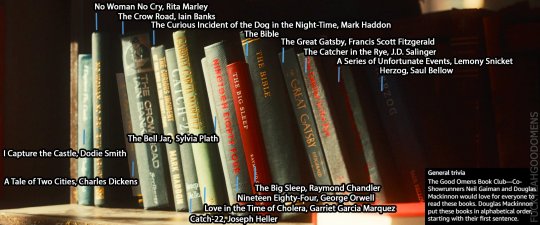
Now we have two series of GO to feast on, we seem to be slowly piecing together the expanded history of the GO universe in an inferred kind of way. It’s rarely given to us directly in a chunk, it’s mostly by a comment here and there and then we try to join the dots.
So we’ve learnt that there was a great deal of time that existed for Heaven before time on Earth got started, in 4004 BC, maybe an ineffably long period of time, maybe millions of years, maybe not. Sometime prior to 4004 BC, however, there was a rebellion in Heaven between at least two factions of the angels. This event is sometimes called the Great War - which is what Aziraphale is referring to in S2E6 when he is removing his halo for demon-detonating purposes; he’s not referring to what us humans would call World War 1 in the early 20th century. The result of the Great War led to the formation of Hell. The angel known as Lucifer was the leader of the losing side, and he was known as Satan afterwords. A third of the heavenly host of angels were sent with him down to Hell, and this event is called the Fall. They became fallen angels, or demons. At some point, there is supposed to be a second War, one that will decide who is the winner once and for all time. Well, that’s supposed to be the Plan - God’s Ineffable Great Plan, right? And we all know how the first attempt for that to get started ended up, don’t we?
As we start to look more closely into parallel stories and scenes between the two series, some curious pairs of parallels are starting to emerge. And even more interesting is that some of these pairs indicate that they will get a third presentation - I’m not just talking about the 1941 Blitz scene here, there are others! And I’m going to try and talk about one of them here, that I think has largely slipped under the radar up until just recently.
There was a meta by @newfangledfancy here about the two parallel scenes in S1 and S2 involving miraculous escapes from being shot with a loaded gun, and we should expect a third one in S3. It’s worth pausing and heading over to read it at this point, but if you don’t, I’ll try to fill you in - and I will revisit in the future, as while it contained the seeds of inspiration for this meta, it also reveals something interesting about Crowley's backstory that's worth discussing on its own. You probably know what and where the S2 “miraculous escape” is referring to: the Bullet Catch scene during the 1941 Blitz minisode in S2E4. But where is the one in S1? It’s at Tadfield Manor, in S1E2, after Crowley has turned all the paintball guns into real guns, and Norman, on the yellow team, cracks it, does a big rant about his life and charges into the firing line of the opposing red team, only to be shot straight in the heart.
Let’s rewind this a little bit, because I want to talk about when Crowley and Aziraphale first arrive at Tadfield Manor. All seems calm and quiet. They stroll in side by side – and are each shot by a paintball. Yep, this has been watched over and over, comments made about the colours of the paint, how they represent their various “sides”, and the sexual innuendo in way Crowley miracles it away after Aziraphale makes heart-eyes at him. But you’ve all missed once very important clue about what was about to go down in the next few minutes that was right in front of you all along.
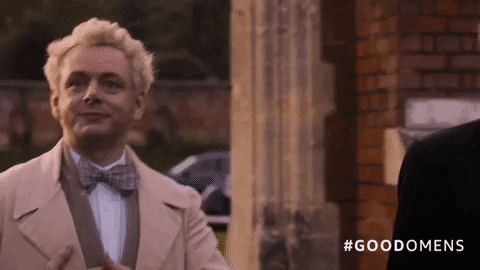
Maybe I should pause this meta just here and refer back to my big colour meta I posted recently. I specifically went to all that work so I could come here and discuss the following event at Tadfield Manor.
Firstly, the paintball colours. There are three: blue, yellow and red.
There is a discrepancy between the colour that book!Crowley and screen!Crowley gets hit by. In the book its yellow, but in the tv series its red. Just at this point I’m going to emphasize that yellow is not the same as gold; gold is one of the colours of Heaven, but yellow is usually associated with fear.
Secondly, Aziraphale is hit with blue paint. That’s consistent with both book and tv. Then Crowley blows the blue taint of Heaven away, because Aziraphale needs help to escape its abusive clutches, its not something he can do on his own. Ah, a cute demonstrative metaphor there, another layer to that little scene.
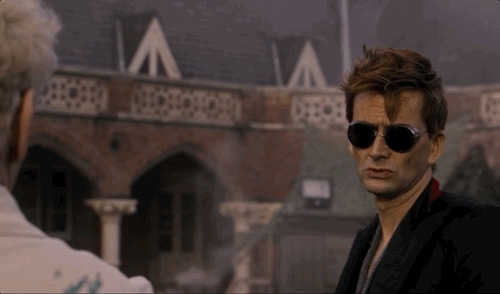
BUT YOU DON’T SEE A BLUE COLOURED TEAM IN THE FOLLOWING BATTLE! Where is the blue team, that supposedly represents Heaven in the following battle? Did they just vanish when Crowley snapped his demon-miracle into place? I dunno, but we just see a yellow and a red coded team for the rest of the battle. But if blue is always Heaven-coded, yellow is fear, and red, while often demon-associated should be seen more as an indication of passion…what it really going on? Who is at war with who? It can’t be Heaven against Hell, because Heaven is not present, per se, as you know it, and neither is Hell, which is usually green. Oh no, it’s not that black and white…because we are watching a battle where Hell doesn’t yet exist, there is only Heaven at this point. One side, one faction, in fear, the other fighting with passion, and the division that actually creates the ‘blue’ side is yet to occur…
We’re watching a re-enactment of the Great War.
Let’s take another step back, to here: S1E2, around 15.46 minutes in. Newton Pulsifer is about to start a new job (wait, what? What the Hell is Newt doing mixed up in this? To honest, I'm not quite sure...*looks at a certain at note she made IN ALLCAPS again*...oh ffs- that is the worst joke, its got to be one of Terry's...now I can't stop cackling...oh, god now I've spotted another awful, awful joke...poor Newt, I love you more every second...)

*ahem* Back to the impending battle. Because it's here in the office of UNITED WORLDWIDE HOLDINGS (HOLDINGS) - an office *wink wink* of management and bureaucracy, that we establish the tension. As Newt slides into his seat, Nigel the manager arrives to ask who is exited about the upcoming "training initiative." Turns out, not really anyone has much enthusiasm for it.
Janice is going to complain to HR. Nigel points out there is no "I" in team, and Norman, who apparently organized the whole thing, proceeds to pick the three 'eyes' out of the "team building exercise."
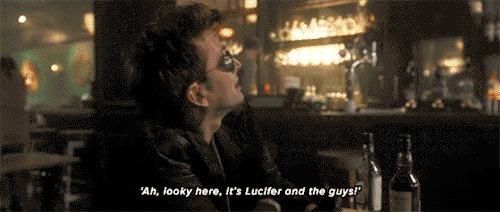
This is going well, isn't it? [Newt departs. His role here is done.]
Lets skip to Tadfield Manor and the "training initiative" is underway. The Red team, lead by Nigel the Manager, seem to have the upper hand. The Yellow team see to be pleased at a chance to let off some steam with anyone who has annoyed them, the bitches.
Then God drops in to make an interesting observation.
Firms these days expected more than that. They wanted to establish leadership potential, group cooperation, and initiative, which allowed their employees to fire paintballs at any colleagues who irritated them.
Oh. Right. Lets deliberately cause a little chaos so we can see who's got leadership potential, who works together, and who actually has some brains? Go God! Lets start a little War and we'll pick the new Archangels out of the winners? Nice one. Plus, we get rid of all the troublemakers in the process, and we'll just be left with those who like to follow management's orders...
Then Crowley ups the ante. As the young woman who was the only keen employee to come, and is on the Red team, no less, runs past and asks "Who's winning?" he snaps his fingers and to change all the paintball guns to real guns.

Cr: You're all going to lose. Az: What - what the Hell did you just do? Cr: Oh, they wanted real guns, so I gave them what they wanted.
You're all going to lose.
Aziraphale does his best to protest at the demon's bit of wicked mischief.
Az: But there are people out there shooting at each other! Cr: Well - Lends weight to their moral argument. Everyone has free will, including the right to murder. Just think of it as a microcosm of the universe.
A microcosm of the universe?
Who's universe, Crowley? Yours? The humans? It's a big universe out there...
Things don't seem to be going to well for some, and Norman, on the Yellow team, has finally reached his breaking point. He makes a declaration. I'm only going to quote the last bit of his little speech, as I want to deal with the first bit in another meta. As he takes off his tie, and wraps it around his head, he says:
"They want war, we're going to give 'em war! OK guys, let's go get the bastards!"
Hmmm. Do the visuals remind you of anything?...


He turns around to charge out - and is promptly shot in the heart. While it's Nigel the manager he is facing when it happens, it's actually the young woman from the Red Team who ran past Crowley and Aziraphale inside the Manor, who asked who was winning, that fired the shot. The implications of this? I'm going to save that for another meta.
The sequence moves on to the infamous wall-slam encounter, which I don't think we need to go over here, so lets skip to where Crowley and Aziraphale have finished questioning the past-Sister Mary Loquacious and have decided they've found all they are going to find here its time to leave. The police have arrived and have broken up the fight. The fun and games are over. As they walk, floating unnoticed and serene, through the chaos, Aziraphale starts to ponder.

Az: You'd think he'd show up, wouldn't you? You'd think we could detect him in some way. Cr: He wont show up, not to us. Protective camouflage. He wont even know that his powers will keep him hidden from prying occult forces. Az: Occult forces? Cr: You and me. Az: I'm not occult. Angels aren't occult, we're ethereal.
Crowley refers to the two of them as one kind of entity, but Aziraphale insists there is a difference - they aren't the same. Not any more.
The War is over, and the division between Heaven and Hell has been created.
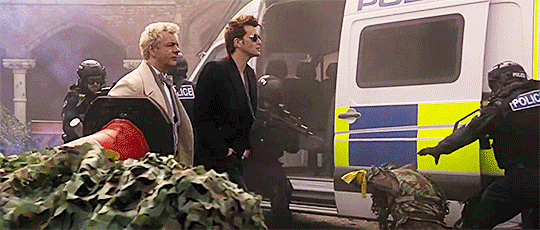
[Edit: I've since finished a meta on the Bentley and it's connection to crossing the thresholds between worlds. I mention this scene in it, as it is actually a beautiful example of two different times and places existing at once, overlaid on one another, as indicated by the smoke - that's a sign we are in a subliminal space. Its why Aziraphale and Crowley seem to just glide through untouched and noticed, as they aren't really there, in a way.]
Will we see another echo of the Great War in S3? Possibly.
It's the 3-card Monte. Its the three cowrie shells and a lone caraway seed. It's the Professor's Nightmare, where you don't know how long a piece of string rope is.
It's a f*cking Mobius strip that has no beginning and no end, infinitely going around and around.
It's God's game. Only She knows where it stops.
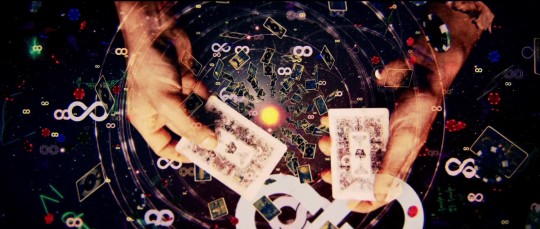
Further reading in this series:
#2: The Newton/Crowley Mirror-Parallel in S1
#3: "Not Even At Gunpoint!"
#good omens#good omens 2#crowley#aziraphale#good omens meta#good omens analysis#tadfield manor#the great war#paintball scene#miraculous escapes#he did the thing with halo#lucifer and the guys#newton pulsifer#combating the forces of darkness#mobius strip#future echoes of the past
92 notes
·
View notes
Text
Story Time - Call Me By My Name(s)
Story time are a series of personal life story posts about our history and experiences. We make an effort to voice them but the full text (and some images) are underneath.
It's late spring 2019 and we are standing in the lobby of a local hotel. It's long past 2am. Likely closer to 4am. We are wearing our movie theatre manager uniform, fresh from another lengthy shift that goes past 1am. The odor of popcorn clings to us like a phantom.
One of our two closest friends is mopping the lobby. We had stopped by on the way home to visit him at work. Our mind is drifting as we talk. Our imagination is conjuring images of streets and buildings half a world away.
"By the way [my husband] and I started calling you Camden when [your wife] isn't around. I didn't know if you would mind."
He said it so casually. Though it was the most natural thing in the world. They likely had no concept of how cataclysmic that moment was. For the first time in our three decades on this planet someone had given us permission to accept a name that we dared not claim ownership of.
It was offered without thought. Without expectation. Without cost.
Nothing could ever be the same after that moment.
And he was just mopping floors. Unaware of the gift they had just given us.
This conversation took place half a year before we formally came out of the closet. Those in our inner most circle; people who were closer than blood; were aware by now that we were closeted. It was hardly a well guarded secret.
Our chosen name was not difficult to guess either, as we shall soon learn.
But in that moment it came as a sobering surprise all the same.
Our two closest friends. Our family recognized us as a woman and without being asked, without being told; knew the name of that woman was Camden [Dawn].
(Rest of text below readmore)
-
The name Camden was first whispered into existence in 2001; on a Sonic The Hedgehog online community of all places.
The community had a fun little gimmick where everyone's screen names were attached to a character in an ongoing shared fiction that represented the message board. Every time the theme of the community changed, even for April Fools, it was treated as happening to our characters in this shared fiction.
We were young. It was silliness for the sake of silliness.
The admins and mods were a ruling council in charge of the "city" and its inhabitants.
One of the admins was our childhood best friend. Gossiping about the community had become one of our biggest bonding points and we would often tell her what was going on in the community when she was too busy with school to browse for herself.
We cannot recall if the term "Lackey of the MoFo" came from others or was something we branded ourselves with but it stuck.
Our character within the shared fiction was the Jarvis to their Avengers. The straight man. The butt of jokes.
In a world of loony toons, fursonas and Sonic OCs we were the normal and non-powered human.
Craig the Lackey.

In story he was a normal kid. Raised in an orphanage, which says interesting things about how we viewed our parents after our stint of homelessness. His characterization was that he was "sane" within that wacky world, that word, "sane", came up often in posts about him.
He worked hard, was the butt of jokes and just repressed it with a smile on his face. Took it and kept on marching forward. Much like the person writing his posts.
He was kind, helpful, well behaved, stuck close to authority, did as he was supposed to. He was a good boy.
But every now and again when we browsed the community we would get upset. Early signs of our BPD no doubt. Moments where our repression couldn't stick and we lashed out.
People noted this was what happened when we got Stressed.
and as everything that happened on this board was lore, Stressed Craig was added into the roster of characters. An alter ego who we turned into when we got too stressed out.
The term we used on the board was "ego shard". Alter would have been more appropriate but we were decades away from being diagnosed with DID at the time.
Of course. This isn't about our disorder. This is about our gender.
We had mentioned that forum events were canon within the lore of the ongoing story in the forum, correct?
2001 was when the Pretty Sailor Soldier Sickness event happened.
Every person on the board was encouraged to make a new account with a Sailor Moon inspired version of their normal character with the lore saying that a virus had spread through the forum turning everyone into a magical girl. Those who pretended they were immune were mocked in posts and written to be in denial in the lore.
We created our avatar ourselves using an SNES sprite of Sailor Jupiter.

We named her Camden.
Camden, Stressed and Craig made up the first original characters we ever wrote. They were all "me" in every real sense. We did not lie. The character we played was just ourselves. The guy who had to work hard to keep a roof over his head while he struggled to pay the bills. Not yet 20 and already with the weight of the world on his shoulders. The stressed version was something buried that was yet to be unearthed.
The Sailor version?
Why did it feel easier to write her? More fun?
We depicted her as an alcoholic. She was angry. She didn't care about reputation or having to do work. But she was desperately lonely and unfulfilled. She felt like she was living half a life. She knew she was not Craig and somewhere in her heart that made her feel the deepest sorrow.
We could only enjoy the pockets of gender euphoria sandwiched in the truth that we were a man. We were a good boy. We were not allowed to be angry about our situation. We were not allowed to lie.
She represented a lie. A version of us that was everything that existed in our hearts that was not allowed to come to the surface. The lie she represented was that the mask we wore, Craig, was a performance. The obedient and respectful son who we needed to be to avoid rejection and pain and poverty.
...but we had already been rejected, hadn't we? Holed up in our eminent domain, alone in the world spare for the people in our computer and at work?
Pretending to be him didn't protect us at all. Did it?
...aren't you tired of being nice? Don't you want to go a little apeshit...?
The Sailorness event ended. All the events ended. People went back to their regular posting.
But we kept the Sailor account. Why not? In the lore the Sailorness Sickness had been quarantined to its own district. But we did not recall the virus creating clones. So if Camden and Craig were truly two people then we'd have to justify that in canon.
We'll spare you the story but the key thing to note is that since 2003 until we left the forum in 2012 the three versions of us were one. Born as Craig, yes, but converted to Camden via the Sailor Sickness and as there was no cure, Camden she remained. The Craig and Stressed after this point were psychic projections that even Camden did not know she was transmitting. Craig continued to be the "main" account the entire time. But as we typed each post we knew all too well he was just a projection of Camden. Someone who still, to the end of her time in that story, believed that Craig was the one who got to live The Life. Someone who always felt like she was not allowed to express herself or become or exist.
If the posts did not exist in archive it would be difficult to believe we had written such direct metaphors for our gender and dissociation 20 years before embracing either one.
-
Camden stuck with us. Like a longing presence that itched within our mind. She made no sense outside of the context of that one forum and yet the idea of her remained bouncing within us. Begging for recognition.
Begging to be the one with The Life.
Her chance would come and then be denied when our first World of Darkness tabletop campaign was being prepared. We were so nervous about this new and scary hobby and wanted to play it safe. Play a character we knew.
Camden seemed as good a pick as any. Something about being able to present live at a table was alluring in ways our egg brain could not comprehend. We pitched the character Camden Dawn.
Our wife did not like this idea. She stated discomfort at the idea of us playing a female character... and... though the gravity of this event would ripple through years, though ultimately this discomfort that never truly went away would contribute to the ending of the marriage, I shall not dwell upon the negatives or speak ill of someone I loved for most of my life.
I can not assume her motivations and find it unfair to editorialize over our past like this.
Suffice... Camden was put back inside and instead Tyler Dawn was the character played. Camden was made to become his older sister. A non-playable character.
Tyler's plot could fill its own Story Time segment, particularly in how he was a window that the Friends-we-called-Family used to witness our gender identity and potentially our undiagnosed dissociative disorder.
Years after the tabletop game had ended and we had run our own sprawling tabletop game about mad science and isolation; Camden started featuring in our custom playable characters on mobile games, Pokemon Go being the most recognizable example.
We were compartmentalizing our gender expression and identity heavily in this portion of our life. Much of it is still not fully clear this far into therapy but Dawn had come into being and had her online life within online kink communities. Her own name had not yet been selected, though she had a few she cycled through such as Sapphire and Honoria.
Cammie had long been accepted as this immature ball of affection that was called Kitty, so normalized as part of our general expression that no one even questioned the fact that the pet name only felt appropriate during certain moods.
Wynn, though not recognized as her own entity at the time, was identified as "Miss Manager"; the movie theatre boss that friends would see us transform into when our phone went and we were forced to put out fires, sometimes literal.
It was the Camden/Craig divide that remains the hardest to spot as more and more as the years went on the repressed gender identity became harder to ignore and the South London boy who acted the way his father expected was away from his roots, culture and origins.
It makes those pockets of time where we could type our name as Camden and play a woman on the privacy of our cellphone all the more comforting.
Our tiny little Family of friends could see the screenshots and trade requests. It was never supposed to be a secret. It was just private. As not to trigger that ever present discomfort our wife displayed at our female presentation.
So it would go on.
And then the other couple in our little circle began calling us Camden.
...and we couldn't go back...
To this day we do not know why our ex-wife resisted the name so hard. When we went to an event in 2019 presenting as Camden for the first time, she argued that the name itself is what bothered her and even pitched Kitty as an alternative.
Maybe she resented the privacy of Camden? That she was a name and a part of our presentation that she was not privy to? As I mentioned... at this point the line between Craig and Camden was a blur. Again. I will never know. Gender and identity were topics we were not able to be fully honest about that side of discovery. I truly have no idea how it looked from the outside and have, after divorce, apologized to her for our inconsistent and unfair behavior; noting the fact we cannot tell how fair we were even capable of being given the hidden nature of our disorder.
Even still.
The first time our Friends who were Family spoke our name was love and recognition.
...
The day she called us "Camden" was the day our marriage truly ended.
We have spent a lot of time turning over that event in our head. Each alter viewing the memory from their own perspective and putting their own spin on it. We have recalled it so many times that there's no way it is a factual representation of what happened anymore.
She wanted us to tell her what to do. What to say. To find the right words.
A concept so many who denied our gender have tried and failed in the years since we came out. To learn the language and perform the act of acceptance. Not change the way they thought. Change the way they behaved.
Maybe it's unfair to hold someone to that standard but we made it clear in the argument that lead to the event. We couldn't tell her what to say or how to behave. We told her that hearing the name Camden made us happy and feel recognized and comfortable. That we wouldn't force it but it was lovely when it is offered.
Maybe the way Camden remembers it is the true way and we used the wrong words, failed to bridge the gap.
Maybe the way Wynn remembers it is right and we were callously twisting the knife, refusing to let her off the hook or give her an easy out.
Maybe Cammie is right and we were panicked and trying to placate and were too terrified to stand up for ourselves.
It doesn't matter.
The result is the same.
"Camden!"
Funny.
In that hotel lobby the name was spoken so naturally and normally. Like of course the name of the person standing here was Camden. It's always been Camden. Didn't you know that?
The universe realigned itself to ensure that truth was sealed into all of time and space. History rewrote itself to make true the entity within this heart who over an imperceptible shifting of states had replaced the entity whose name matched our birth documents. Craig was a mask. He always was.
A spell had been cast in that lobby in the middle of a summer night and even though we consider Camden as an identity to have been created in our late teens. The 4th alter in our system. She became our the face we wished to reflect to the public. In a way she always was. Ever since she emerged to handle things when our family kicked us out. The body just needed some time to catch up.
On that October afternoon when our spouse spat those same syllables at us. Demanding to know if it was what she wanted us to hear; a different spell was cast. History shifted again and this time bonds that felt immutable were broken. The past changed to reflect the fact that there was no future.
...it's so sad how quickly that can happen. Hearing a single sentence or reading a a few words can just shatter a heart and ruin everything.
We left her a week later. Started going by Camden full time within 3 months.
...the Friends who were Family we left a couple years later. The spell that time was "I do not want to be bloodbond, family-style close." and I'll be fair to the man who wrote it... I legitimately do not believe he knew those words broke us. That it made us feel like that powerless 17 year old being tossed out on the streets again. A fucking stupid reminder that even to those we considered Family we were expendable, disposable and ultimately unwanted.
That's my baggage to bear. Not his.
Either way, I couldn't honor his wish. I still can't. So I did the only thing my heart could tolerate. I left.
I'll always be grateful for the fact that the pair of them cast that first spell that allowed us to claim the name we so desperately longed to hold. Maybe we never needed that external validation and recognition but it felt like we did. It meant the world and so much more.
To us that original magic spell was the most dramatic shift of our life. People knew us and loved us and trusted us so much that they could see our hidden face and knew it by name. But it was spoken so casually. So thoughtlessly.
Just a "by the way" inserted into a conversation. One of hundreds of casual reminders of affection at a time when they were needed.
It sincerely wasn't a big deal to them.
Then again, in 2019 "it wasn't a big deal to them" was this magical and beautiful thing. That's just how much they loved us. How could they see us any other way?
But... maybe it wasn't a big deal to them and he honestly had no idea how big of a deal it was to us.
I guess we'll never know.
#dawn posting#story time#t4e#voiced post#this is my gender and I am proud of it#watch me post my trauma in public
7 notes
·
View notes
Text
An X-Files expert on the show’s enduring appeal – 30 years on
by Bethan Jones, Research Associate at the University of York

On September 10 1993 the pilot episode of The X-Files aired. Thirty years later to the day, I was at a convention centre in Minneapolis with 500 other fans and the show’s creator, Chris Carter, celebrating its legacy.
Ostensibly a show about aliens, The X-Files swiftly became part of the cultural lexicon and remains there to this day. In part its success was down to the chemistry of its two leads – David Duchovny, who played FBI Special Agent Fox Mulder and Gillian Anderson, who played FBI Special Agent Dana Scully. After all, it was the X-Files fandom that invented the term “shipping” (rooting for characters to get together romantically).
But, as I argue in my new book, The Truth Is Still Out There: Thirty Years of The X-Files, what really made the series successful was its ability to tap into contemporary cultural moments and ask us to really think about the times we’re living in.
When the series began in 1993, the US was still grappling with the effects of Watergate and the Vietnam war, but concerns were also rising about the approaching millennium and the economic and cultural divisions within US society. It also coincided with Bill Clinton becoming president – marking the end of more than a decade of Republican leadership.
It’s little surprise that fears about immigration, globalisation, national identity and technology emerged and were adopted – and sometimes foreshadowed – by The X-Files’ writers. Several episodes throughout the first nine seasons dealt with artificial technology, for example, and Eve, an episode in season one about clones, came four years before the birth of Dolly the Sheep.
Critical theorist Douglas Kellner argued in 1994 that The X-Files “generated distrust toward established authority, representing institutions of government and the established order as highly flawed, even complicit in the worst crimes and evil imaginable”. Though I’d argue it was less that the show generated this distrust and more that it leveraged the growing number of reports about the government’s secretive activities to inspire its storylines.
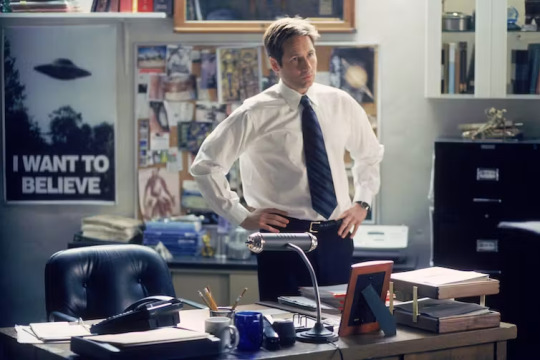
As the public became more aware of the government’s role in – and surveillance of – public life, so too The X-Files considered the ways in which technology could be used as a means of control.
In the season three episode Wetwired, for example, a device attached to a telephone pole emits signals that tap into people’s paranoid delusions and lead them to kill. And in the season six episode, SR 819, a character’s circulatory system fails because he has been infected with nanotechnology controlled by a remote device belonging to a shadow government.
These themes reflected growing concerns about government agencies using technology to both spy on and influence the public.
The X-Files’ enduring appeal
During my X-Files research, carried out with viewers after a revival was announced in 2015, it became clear that the show has remained part of the cultural lexicon. As one fan explained: “The cultural context of conspiracy theories has changed since the beginning of X-Files. Nowadays, every pseudoscience documentary uses similar soundtrack and narrative.”
Of course, the X-Files didn’t invent conspiracy theories, but as one of the show’s writers and producers, Jim Wong, points out, it did “tap into something that was more or less hidden in the beginning when we were doing it”.
youtube
The focus on the rise of the alt-right, disinformation and fake news in seasons 10 and 11 seemed like a logical angle from which to approach the changing cultural context the revival came into. Carter and his co-writers dove straight in to what Guardian critic Mark Lawson calls “a new era of governmental paranoia and public scepticism”, fuelled by the 2008 financial crisis, the fall out of the war on terror and scores of political scandals.
Season 10 saw the introduction of a right-wing internet talk show host who argues that 9/11 was a “false flag operation” and that the mainstream liberal media lie to Americans about life, liberty and the right to bear arms. The parallels to conspiracy theorists like Alex Jones and Glenn Beck were obvious.
Carter’s incorporation of topics like surveillance, governments’ misuse of power and methods of social control meant that seasons ten and 11 were very much situated in the contemporary moment. This is perhaps most obvious in the season 11 episode, The Lost Art of Forehead Sweat, which deals with the disinformation of the Trump era head on. The episode’s protagonist, Dr. They, tells Mulder that “no one can tell the difference anymore between what’s real and what’s fake”.
While The X-Files’ search for the truth in the 1990s may have ultimately been a philosophical endeavour, in the 21st century it is a commentary on how emotion and belief can be more influential than objective facts.
Watching the show again while researching my book, I was struck by how it was dated predominantly by its lack of technology, rather than the ideas it expresses. In the second season episode Ascension, Mulder pulls a phone book off a shelf in his search for Scully – now we’d use Google. But in other aspects the show remains as relevant today as it was in the 1990s, encouraging us to think about the big questions relating to faith, authority and truth.
#science fiction and fantasy#science fiction#sci fi television#the x files#x files#sci fi tv#featured#Youtube
33 notes
·
View notes
Text
History's Vikings: The Blue-Eyed Man, The One-Eyed Man, and The Odinquest
In my previous post I discussed how the Vikings TV show does a good job depicting a moral and cultural framework built by a religion that isn't related to Christianity in some way. Among the many story elements that this clash of religious and cultural differences creates is a language of imagery that is truly unique.
Again, I don't really have a planned endpoint for this post, I just think this stuff is cool and I want to talk about it.
I'd like to also come out and say when I am commenting on the tropes and imagery of the Vikings TV show and not the real historical Vikings. The show is very accurate to certain aspects of real history, but in other areas it is also very not accurate to history and I am really not qualified to designate where that line exists. Furthermore, the Norse Religion is a very real, very active religion that is still in practice to this day, and I don't want to comment on how a real adherent might interpret or venerate their gods. I'll be speaking from my perspective as a fairly secular western person and as a fan of the show. I'm truly not out to spread misinformation or harmful stereotypes, so please exercise discernment. Thank you.
The Blue-Eyed Man
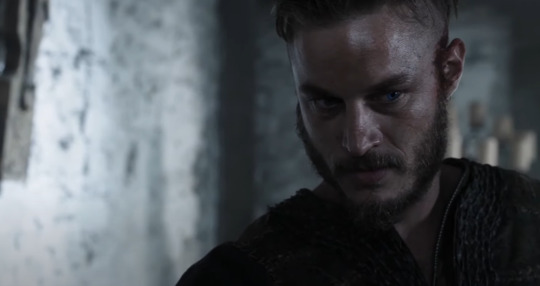
Early in Season 1, there is a really interesting visual artifact that can be hard to spot if you're not paying attention to it: and that is Ragnar's ridiculously blue eyes. Granted, they are very prominent, but so while you might remember seeing them show up, it's less likely that audience members clued into it being an element of the story.
In most daylight scenes, Ragnar's special blue eyes are apparent, but not particularly special---it's not until you can see his in darker shots that they become especially strange. One the one hand, this is potentially just a CGI issue which give his eyes something of an accidental glow, but let's assume for a moment that it is, at least mostly, purposeful.
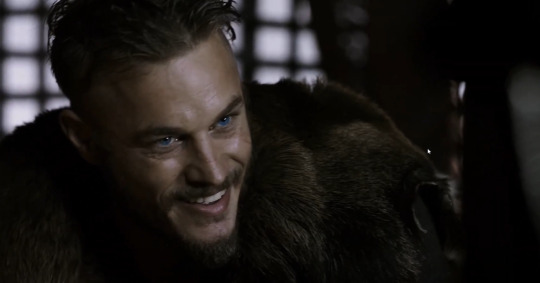
Ragnar's blue eyes serve a couple of purposes in the context of the early seasons of the show. They represent his ambition, his viciousness, and most importantly, they represent his genius.
Something that the show does not frequently acknowledge is that Ragnar is a genius intellect amongst his kin. Rollo at one point comments that Ragnar is strange, and rarely holds grudges, and Bjorn struggles most of his adult life to replicate and emulate Ragnar's strangeness and his forward thinking. In Season 2 and 3, Ragnar's genius is shown most prominently in his conflicts with Jarl Borg, King Horik, and the Franks---he's clearly always a step or two ahead of not only his competition, but also his contemporaries.
Ragnar's genius is also a really important key to understanding the unique way the show has chosen to depict Vikings writ large. For many decades in the modern era, our interpretation of Vikings has been largely influenced by characters like Marvel's Thor, who has been a huge part of creating the Viking stereotype of an honorable, boisterous, and exceedingly thick-headed warrior. Ragnar, and the rest of the Vikings, show us a very different interpretation. The show refocuses Odin as the primary god of the Viking religion, and reminds us that Odin is not only a god of war, but also of magic, and cunning.
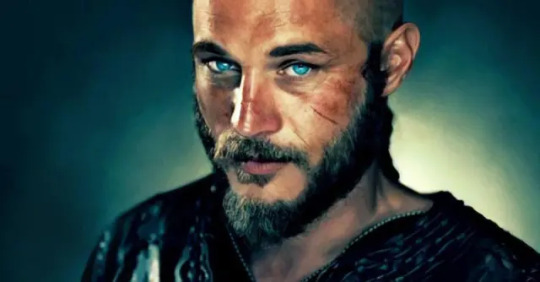
Which is why it is so important that Ragnar is also cunning. In a society that champions that Thor-like boisterousness and physical prowess, and which tends to shame less conventional forms of intelligence (characters like Floki, who live away from Kattegat), Ragnar being the convergent point between warrior prowess and cunning intellect makes him something of an apex predator.
Which brings us back to the eyes; It is in the last episode of the series that the show finally acknowledges the imagery of the blue eyes through the line "Blue eyes mean danger." Every scene that shows off Ragnar's eyes is giving us a window into the mind of hungry predator, a great monster who could decide at any time to feast on those around him.
The imagery of the Blue-eyed Man reaches its apex, and its least subtle period, when Ivar enters the. Ivar's eyes are so blue he basically has the Eyes of Ibad from Dune---and with him they begin to take on a new meaning: madness.

Ragnar himself does suffer from a certain amount of the madness that comes with great genius---but Ivar is always suffering from it. Ivar truly struggles to fit in with his contemporaries, not only because of his physical disabilities but also because he is deeply mentally unhealthy. Ivar's eyes do glow blue when he is experiencing moments of great cunning or profound cruelty, much in the same way his father did, but he adds to that an ability to fly into a special kind of berserker rage---one powered by his mental instability.
Much of Ivar's story is also focused around how he takes many of his father's flaws and drives them to their most extreme outcome: Where Ragnar had a capacity for cruelty and insanity, Ivar's kingship was defined by it. Ragnar was able to harness his intellect and political cunning to choose his own death and make it the catalyst for the era of the Great Heathen Army---but Ivar was ultimately consumed by his own madness, by his own need to fight and bleed, and to a certain extent by the depression that follows him throughout the show.
I would call these eyes the Eyes of Óðr, the divine madness. In the context of the show, they are designed to set apart those who are touched, driven, intelligent, and ultimately: dangerous to themselves and all others.
The One-Eyed Man
The shift from idealizing and venerating a warrior's physical prowess to venerating their intelligence and viciousness is an important part of understanding the Vikings' worship of Odin. In the show, we're told once or twice that the Vikings, in contrast to our modern stereotype of Vikings, don't attack unless they have the clear advantage. Indeed, the Vikings of the show operate more like bandits and pirates than they do like the proud warriors and berserkers of properties like Thor, and even Beowulf.
To worship Odin, to become like Odin in the same way that Christians would have championed Christ-likeness, is to embrace not only his warrior ways, but also his magic, his cunning, and his lust for knowledge.
While innate Odin-likeness is typically represented by the Blue-Eyed Man, the man who willfully chooses to pursue Odin-likeness is often represented by the One-Eyed Man. The image of the One-Eyed Man is applied to and represents those who sacrifice themselves in the pursuit of knowledge.
This one is a little harder to spot in the series, but there are a few examples both prominent and subtle:
In Season 4a, Ragnar transitions subtly from being the Blue-Eyed Man to being the One-Eyed Man, while Ivar replaces him as the Blue-Eyed Man in 4b. Ragnar makes no secret in Season 1 that he, like Odin, would give up nearly anything to have knowledge and power---and while the Ragnar of Seasons 1 and 2 is largely powered by his raw intellect and ambition, this changes as Season 3 progresses.
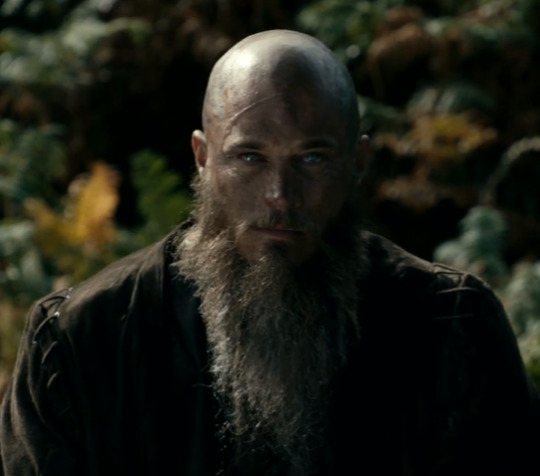
By Season 4b, Ragnar has made a visual change: During his battle with Rollo he sustains an injury that has left a large scar on his temple and brow, and his right eye, while still blue, is now cloudy. I will say: it is not apparent in every scene. Ragnar's cloud right eye is a CGI after-effect and it was not uniformly applied. There are some scenes where he seems to have both eyes intact, and others where its very obvious that one of his eyes is now blind.
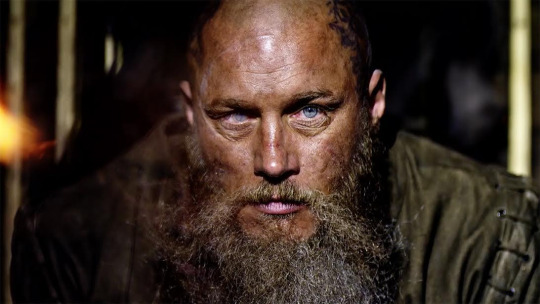

There are a few other characters but few of note: Egil The Bastard is a short-lived side character who one eye that is heavily scarred and blind (and in the uncensored version of the show, entirely missing). Much in the same vain as other characters following this trend, Egil is depicted as conniving and intelligent---but he is also a reminder that not everyone following in the footsteps of Odin is as capable as Ragnar and his family. Egil dies offscreen after quickly being captured and doing basically no damage to the Lothbroks at all.
A vision of Odin himself also briefly appears twice in the show, and for obvious reasons possesses only one eye.
The other major character who subtly becomes the One-Eyed Man is Ubbe.
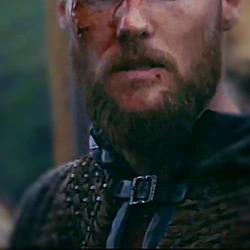

In Season 4 Ubbe is, like Ivar, one of the Blue-Eyed Men---Lagertha and Floki would both go on to comment how much like Ragnar he both looks, and acts. In early Season 5 he is injured on the eye and blood appears in the sclera around his iris. While it's completely reasonable to assume that this maybe doesn't have narrative significance: His first eye injury occurs because he attempts to negotiate with the Saxons and is betrayed---the theme of Ubbe gaining wisdom through hard experiences is one that continues throughout the show.
Ubbe's eye briefly swells shut, leaving him literally one-eyed for some time, and this injury is repeated later on after Ubbe wins his duel against King Frodo and reconverts to the Viking religion. Once again, Ubbe's eye swells shut, but much more prominently than before, signaling the wisdom and experience he had gained through personal sacrifice.
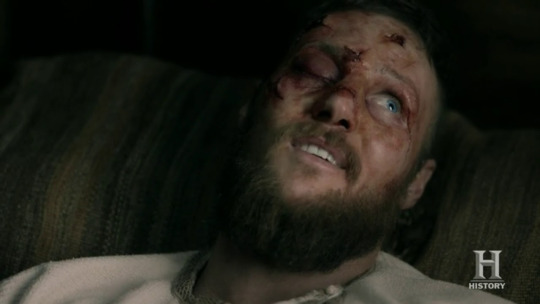
By season 6, while Ubbe retains the use of his right eye, he now has a tattoo that runs up the side of his face, giving the vague impression of a permanent streak of blood and runes next to his eye.
The Odinquest
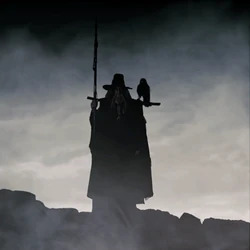
The imagery of the Blue-Eyed Man and the One-Eyed Man share a common through-line in the world of Vikings---and that is the pursuit of power and knowledge. In my previous post, I talked about how Vikings, on the whole, is not truly about the pursuit and implementation of power, but rather it is a meditation of life's completion---and this is still true. It is also true that the pursuit of power and knowledge is a hugely important aspect of many of the characters.
In most western media, there is an undercurrent of the morality that stems from Christianity, and most characters that follow in the traditions of western media undergo a kind of Christquest: literally the quest to become more Christ-like. This can manifest through the character seeking redemption, becoming more merciful or wise, becoming more just, and even simply becoming more capable personally and then using that capability to defeat evil and protect good.
Think Frodo and Aragorn: Frodo perseveres and survives evil through the LOTR trilogy, and learns to rely on the help of his friends when his own ability isn't enough. Aragorn realizes that he has to take responsibility for the kingdom to which he is inheritor to, and his becoming king is the culmination of a quiet character arc concerning Aragorn's own sense of bravery and responsibility towards others.
Even Marvel's Thor more or less follows the tropes of a Christquest: Thor begins the story as a selfish prick and regains his powers when he sacrifices himself for his friends.
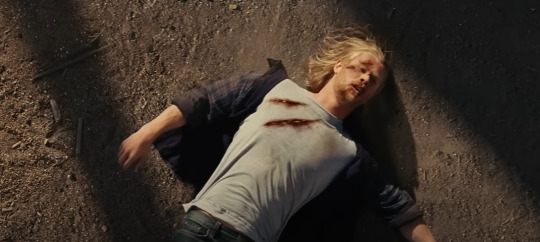
Where the Christquest champions personal growth in the pursuit of Christ-likeness, the Odinquest champions personal growth in the pursuit of Odin-likeness---which I realize sounds a bit ~duh~ but I promise it's worth saying out loud.
The character who completes the Odinquest is not necessarily a good person at the end of their quest. The point of the Odinquest is to become wiser, more experienced, and in some cases the unspoken expectation is that the warrior brings that wisdom and experience to bear as a hero of war.
Returning to the context of the show: the imagery of the Blue-Eyed Man and the One-Eyed Man helps us follow the characters who are explicitly on the Odinquest. The Blue-Eyed Man embarks on the quest involuntarily, driven by his natural ambition and intelligence to want more---while the One-Eyed Man has embarked on the quest willingly, and gains wisdom through sacrifice and experience.
Ubbe and Ragnar both end up completing the Odinquest. Ubbe becomes a wise and discerning leader, who brings his own tribe to the shores of North America. Ragnar becomes legendary, orchestrates his own death, and ensures that his death becomes the catalyst for a new era of history. Each of them shares their revelations in their final moments on screen as wisdom is finally attained, and we can see that the quest has ended as the character themselves slows to a halt in their journey.
On the sadder side of things, I think Ivar actually fails to complete the Odinquest. Despite all of the character growth he undergoes in Season 6, and the cooling of the fire within him, Ivar's redemption falters and is cut short. Returning to the battlefields of England, Ivar participates in an ill-advised raid that he is aware will end in his death. In his final battle, he allows the Eyes of Óðr to overtake him, and he is lost to his madness one final time. Such is the power of his divine madness, that Ivar appears almost magical, capable of directing the battle from within himself.
Ragnar suffers from his own mental health issues which similarly leads him on a path to suicide---but again, with Ragnar there is more time spent reflecting on his revelations, the totality of his life and its meaning, and he gains a certain mastery over his own variety of divine madness so as to allow his death to serve a greater purpose.
Ivar simply dies, having realized that he no longer has a place in the world. It's no mistake or accident that his eyes bloom blue, but both remain distinctly open.
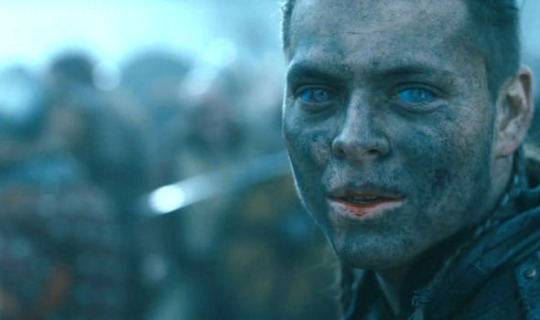
I want to clarify that this does not mean his death was meaningless---only that, more so that even Ragnar's death, Ivar's death is a tragedy. He is a powerful, intelligent mind the likes of which will never be seen again, lost to the madness of his own genius.
In Conclusion
I honestly have no idea how to endcap this beyond that this is what I love about this series. Vikings is by no means a perfect show---there are definitely episodes and moments that make it look and feel like a knock-off Game of Thrones. At the same time, it's filled to the brim with incredible, genius writing, heart wrenching and humanistic storytelling, and thoughtful, honest conversation about the human condition. It's a peak into a world beyond the confines of the structures imposed on us by a Christian-dominated post-roman viewpoint. The Vikings are presented to us, the viewers, as both strikingly alien, and yet oddly familiar: A view of who we are, who we were, who we could have been, and who we could yet be.
#vikings#vikings series#vikings tv#ragnar lothbrok#ivar the boneless#ivar lothbrok#ubbe ragnarsson#ubbe lothbrok#personal essay#writing#writing on tumblr#critique
4 notes
·
View notes
Note
How about favorite NON obscure Mario characters?
Entry-level mario characters? We're really scraping the bottom of the barrel now
ORBULON AND MONA (and their coworkers)
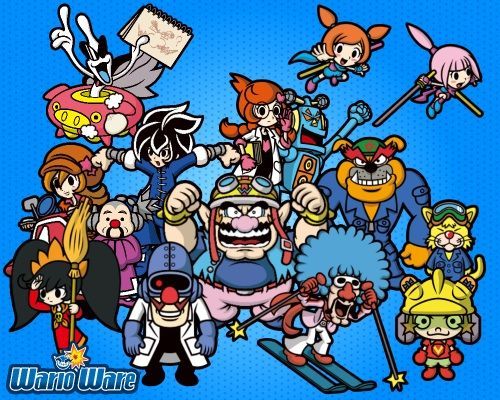
Truly what is there to say here. If you need an explanation for this then go look at my art blog and get out of my sight.
2. IGGY KOOPA (and his family)
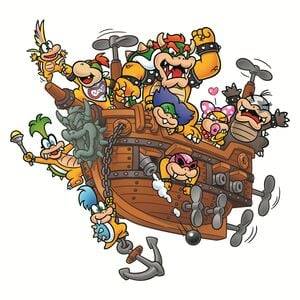
As I mentioned in my yes-obscure mario characters list, i did grow up with a permanent koopaling residence in my brain. Iggy koopa was always the star of the show in my book but make no mistake, I love EVERY koopaling for their own individual merits, there is not a koopa kid I don't adore, if you like one koopaling you have to unconditionally love all of them or else they will kill you. Before warioware, this other dysfunctional squadron of jerks was my muse. Bowser and Bowser Jr. are included in this as well, but there is one specific member of the family I want to give a special shout out to:
3. KAMEK (their grandpa)

Kamek is maybe the best mario character there is. He's, and I don't use this term lightly, an icon. A trailblazer. A gay old wizard. He is bowser's overly-permissive yet loving father figure, and now bowser jr's (AND THE KOOPALINGS') overly-permissive yet loving grandpa. He is a family man. He is also the catalyst of the ultimate conflict in the mario series. Were it not for his poorly-planned exercise in paranoia decades ago, we may very well not have any mario games to play. So if you like any mario game, you have to say Thank You Kamek. Right now. Out loud.
4. WARIO

He's on this list twice because he's so nice. Wario is perhaps the most cruelly underrated character of all time. Nobody appreciates him for who he is or what he represents. I mean they do but not enough. Anyway, Wario is an inspiration. He is an asshole, yes, but he is not only unapologetic in his strangeness but also welcomes the strange into his life and doesn't let go. He is like a collector of gullible freaks, which is what I am. But he is also ride or die for them and a genuinely good friend when he's not scamming them. If Wario was the only person allowed to be mean to me I'd be OK with that.
Also, on a more meta level, I think that he embodies everything that mario can't do. Mario is the face of nintendo, the good guy, and thus he is palatable and measured in a way that falls in line with and is reflected by his games and their ever-important "brand identity". Wario, in-universe, is the heel, the cad, the knockoff mario, and he doesnt give two fucks about what people think of him. This characterization also applies to his games, which are rough around the edges, off-the-walls bonkers, and electrically creative. They are constantly innovative in a more unpolished and experimental way than I think mario dares to be, and most importantly they have the secret ingredient of Love. You can argue with me on that any way you want but if you think that an entire series of in-character diaries and blogs and staff profiles for every single Wario employee that are all funny and consistent with each other over several decades was nothing then I don't wanna hear it.
5. TEC-XX
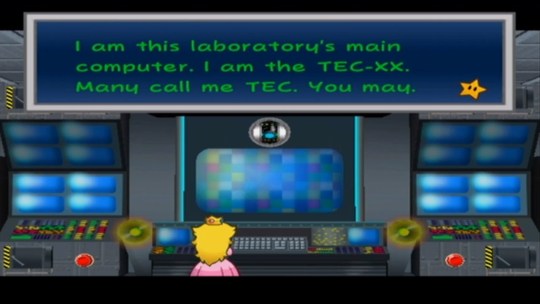
Fanning myself. Moving on
6. BOWYER

I don't really have much to say except that he entered my life at a delicate developmental stage and promptly took a baseball bat to my brain. How the fuck was I to gloss over a deranged slobbering Thing squatting in the woods shooting everybody with arrows that he's yanking out of his skull and talking like a souped-up yoda. And then I have to kill him? Fuck off. He should have been in mario kart
7. VALENTINA

Also from mario RPG, the criminally underrated bastardess Valentina. In addition to having a baroque harpsichord leitmotif and being a walking Jimmy Buffett reference, Valentina is ALSO an evil advisor scamming a town populated entirely by village idiots, which is perhaps my favorite genre of character. I found out via the remake that apparently Dodo imprinted on her and thinks she's his mother, which actually sucks a lot because I always thought she was just his evil sexy boss. I still wish that was the case. But she is also a wretched slimeball to begin with and who am I to deny a girlboss her slime.
8. FRANCIS
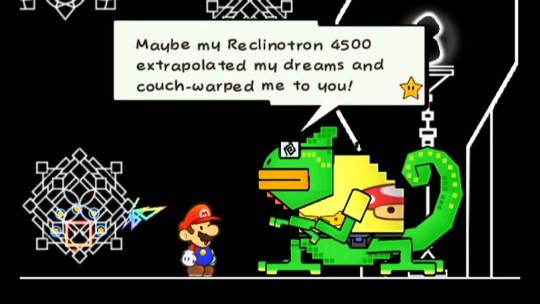
I guess I should fucking put him here even though I don't like him. He is a reminder to us all that we need to calm down. And by we I mean me. He is also, barring Fracktail and none else, the greatest part of that entire game, in my unbiased opinion as a stinky bug-obsessed dogmatic Mario turbovirgin. Mario games will never match that level of hilarious vitriol for the worst parts of their audience ever again. They're not brave enough. But we are truly fortunate that they did. Because who else would readily admit that they go onto message boards to complain about games they've never played? Not me, I'd never do that
9. CACKLETTA + FAWFUL

I'm not separating them. Fawful is an amazing character but his climb to greatness could not have happened without Cackletta, the equally great and toothy villain. Look at her rocket-powered rocking chair. That's hilarious. Anyway, there isn't much glowing praise I can say about Fawful that hasn't already been said before, so what I instead will say is does anyone else remember when there was a movement of extremely passionate and confrontational people who insisted that Fawful's death was faked and that he can and will be announced in Mario Kart right now? We need to bring that energy back
10. SILLY KING BOO
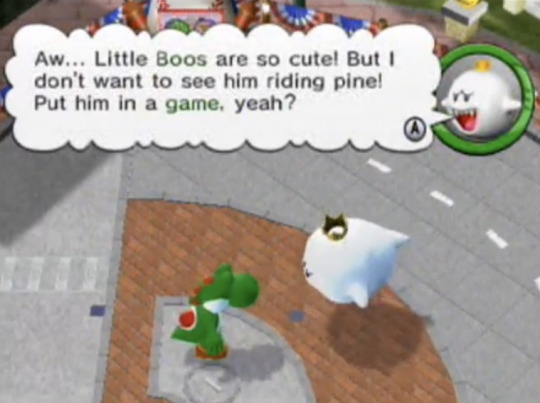
I'm capping this list off with something insane that my fellow Francises are gonna wanna kill me for but I don't care. I am of the opinion that Silly King Boo is a separate entity from King Boo (real). He's just too silly. He's also worked beneath bowser as a minion rather than alongside him as a co-villain, which I think the real King Boo would scoff at. But Silly King Boo has to pay the bills somehow. As distinct from King Boo, Silly King Boo thinks little Boos are so cute, thinks Wario is scary as fuck, loves the opera, tolerates Petey Piranha, does not tolerate spicy foods, and is not actually a legally-recognized authority. Also, one time he got too drunk in a casino at Isle Delfino, but Mario was not there to fight him for that so he was just escorted out.
HONORABLE MENTIONS
Attached is a grab bag of characters who deserve to be here but are not getting their own paragraph either because I have already written a lot about them in recent memory or because I don't feel like it. Here they are
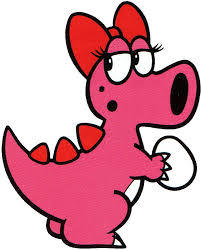
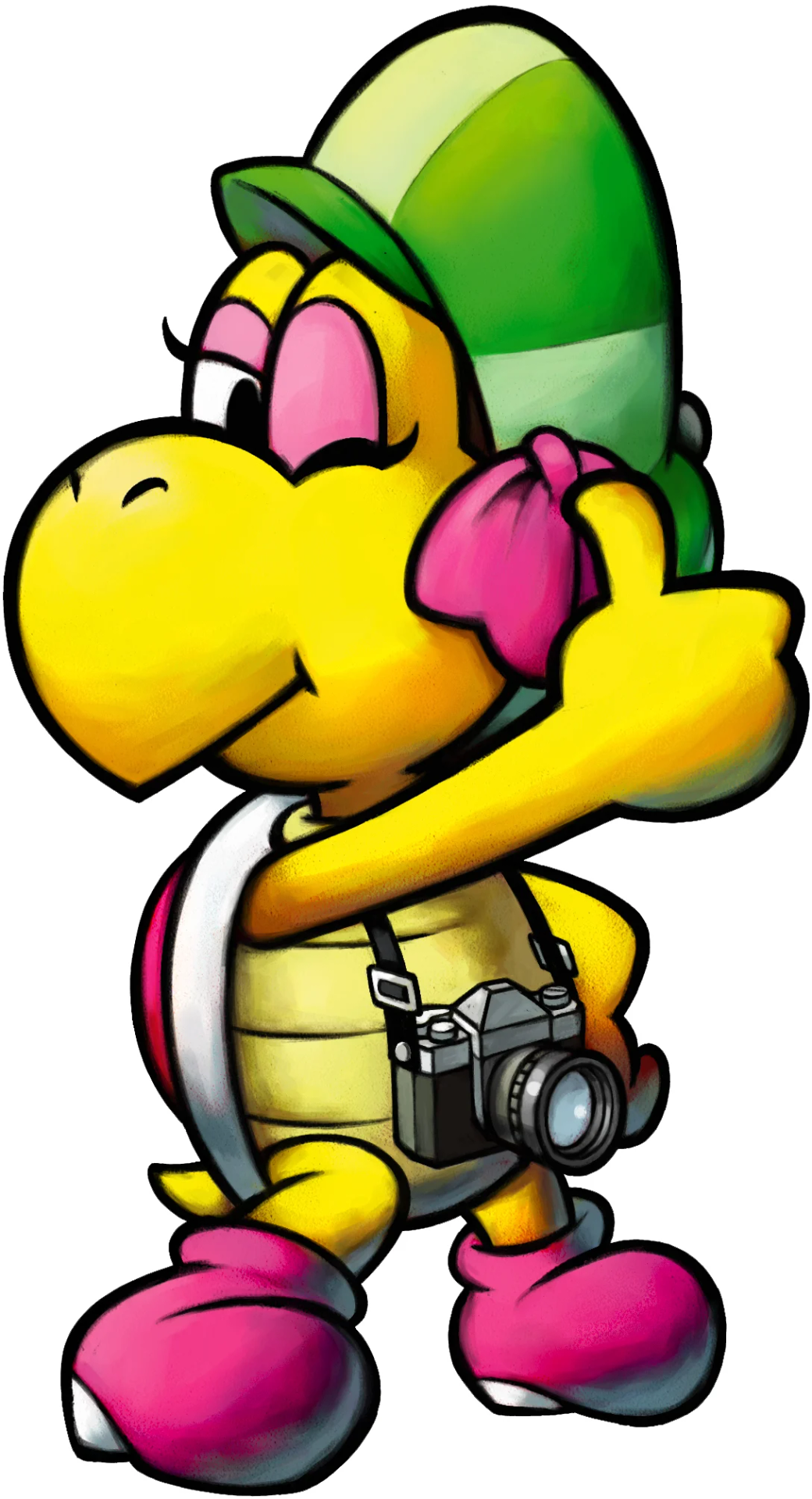
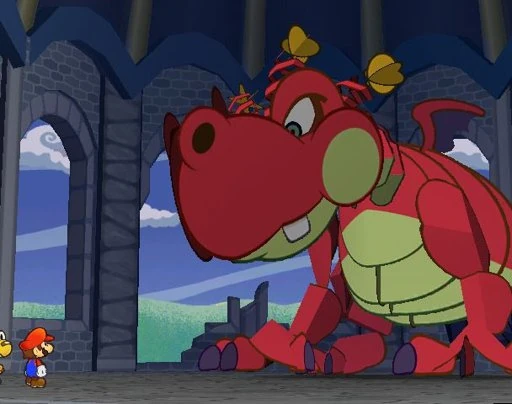




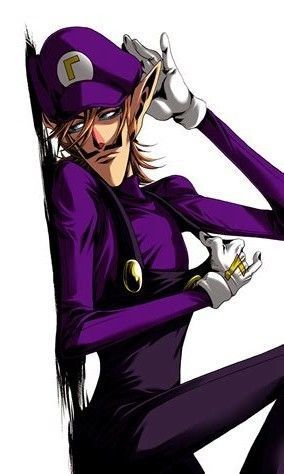
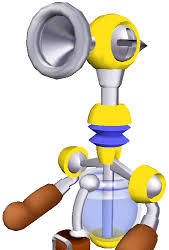
6 notes
·
View notes